JavaScript seems to be disabled in your browser. For the best experience on our site, be sure to turn on Javascript in your browser.
- Dollar Store View
- British Pound Sterling Store View
- or Register

- Loading controls
- Neuronal & Glial Markers
- Agonists & activators
- Antagonists & inhibitors
- Antibiotics
- Ion indicators, ionophores
- Dyes, labels & stains
- Cytokines, Chemokines & Growth Factors
- Neuropeptides
- Antimicrobial peptides
- Photopharmacology
- Pharmacological disease models
- ECL Substrate Kits
- CRISPR & gene editing
- NEW PRODUCTS
- G protein coupled receptors
- Ionotropic receptors
- Ion channels
- Nuclear Receptors
- Transporters
- Antimicrobials
- T-cell Related
- Apoptosis & cell cycle
- Cell Signaling
- Ubiquitin-proteasome system (UPS)
- Oxidative Phosphorylation
- Cell stains, viability & proliferation
- Cell stains
- Cytoskeleton and Extracellular Matrix
- DNA, RNA & protein synthesis
- Immunology & Inflammation
- Proliferation
- Calcium signaling
- Cell imaging
- Epigenetics
- GABA receptors
- Genome editing; CRISPR / CAS9
- Glutamate receptors
- Enzyme inhibitors & activators
- Neuroscience research tools
- Stem cells & small molecules
- ValidAbs™ - data-rich antibodies
- Buying FAQs
- Distributors
- Quality guarantee
- Technical help & FAQs
- Financial help - grants & awards
- Support for scientists
- Protocols, Product Guides & Reviews
- Life Scientists' Guides
- FAQs - antibodies
- FAQs - biochemicals
- FAQs - fluorescent tools
- FAQs - peptides
- Molarity calculator
- Dilution Calculator
- Life science guides
- Scientists interviews
- News, updates & offers
- Science events & awards
- Fun science!
- Who are we?
- Quality - the HelloBio Promise
- Our price pledge
- Scientific Advisory Board
- What are customers saying?

Maintaining PhD Productivity: Tips for Mindset and Organisation
By Britt Berning
A PhD is a big, daunting challenge to undertake. The list of things to tick off is seemingly never ending: reading in your field (and out of your field), experimenting, writing and communicating your research, and much more. As I work my way through my PhD in neurobiology, I keep a lookout for strategies to get my work done properly and in a timely manner. The following are a few key tactics for productivity that I have picked up along the way.
See the big picture
PhD students wear a lot of different hats: scientist, writer, programmer, graphic designer. The list goes on. One of the most important aspects of a PhD is the ability to think like a project manager. Having an overview of the major milestones that comprise your project, and the smaller steps required to fulfill those milestones, will act as a compass to keep you moving along on the right track. It’s important to revisit this big picture regularly as your project grows and changes over time – sometimes the data closes certain avenues, and new and interesting leads open up. There are a range of great project management apps available (I love Asana) but you could equally plan things out in a word document or brainstorm on your whiteboard.
Set realistic goals and take it easy on yourself
It’s better to overestimate the amount of time necessary to complete an experiment than push yourself towards an unattainable goal. Repeatedly falling short of your goals will only dampen your momentum and enthusiasm. Being reasonable with your expectations of yourself gives you some positive feedback and gets you ticking things off faster. It can be helpful to set two deadlines for a task: a hopeful deadline to strive for, and a more realistic deadline that factors in time for optimisation, potential delays in the lab, or periods in your personal life where you may feel the need to slow down at work. That way, if you happen to go over time in reaching your goal, you won’t feel too bad about it and your motivation won’t take a hit.
Spreadsheet everything
Excel and Google Sheets are your best friend. Beyond data analysis and storing important logins such as your ORCID ID, spreadsheets can be used for keeping track of micrographs for publication, or making notes on the literature. A spreadsheet enables you to see everything at a glance and makes it easy to pick up on emerging patterns.
Carry a small notebook in your bag and make use of note taking apps on your phone. Use them to record ideas for experiments or papers as they pop into your head, or plan out the structure of a paper, or design of a conference poster when small pockets of time present themselves to you (perhaps during an incubation period or while waiting for a particularly fickle piece of lab equipment to decide to function).
If in doubt, Pomodoro
For smaller, pesky tasks that I’m prone to putting off, or a paragraph where I’m struggling to clarify my point, I’ll use the Pomodoro technique . Set a timer to 25 minutes and focus solely on that task for the whole time. Break for 5 minutes, and then move onto the next task.
Find an accountability partner
Particularly one who will stare you down when you start checking Twitter in the middle of a writing session. Share your goals for the week, keep each other in the loop regarding upcoming opportunities, bounce ideas off each other and schedule writing sessions together in your calendar.
Do not underestimate the serenity of flight mode
As a researcher, your ability to focus becomes your currency. Guard it with your life. Jumping from task to task and being bombarded by distractions will leave you drained and frazzled. I already keep email notifications switched off at all times and generally check once in the morning and again in the afternoon. When I really need to focus and think, I’ll switch my phone to flight mode and remove all but the essentials from the immediate space around me on my desk so that it’s just me and The Task That Needs Completing.
Done is better than perfect
After a while you have to take a step back, be proud of what you’ve done, and release it so that you can move onto the next exciting thing. The author Liz Gilbert once described perfectionism as “fear in fancy shoes and a mink coat, pretending to be elegant when it’s actually just terrified.” I couldn’t agree more. Perfectionism can be crippling and it really shouldn’t be the badge of honour it’s made out to be. A clear and meaningful result generally means that it’s time to move forward to the next interesting experiment, not time to plug away at the same assay only to make tiny incremental improvements that don’t actually add any value to your paper.
I hope that these tips help you reclaim some of your time so that you can focus on the more complex aspects of your work, think deeply, and take care of yourself.
_________________________________________
Britt Berning is a PhD student in the Neurodegeneration Pathobiology Laboratory at the Queensland Brain Institute, University of Queensland, where she investigates amyotrophic lateral sclerosis (ALS). Her research is focused on changes that occur to the protein trafficking system in the motor neurons of the cortex, brainstem and spinal cord. She believes a picture is worth a thousand words; when she's not playing with a microscope, she is fiddling with her camera. You can follow her on Twitter to learn more about ALS and cool new findings in neuroscience research or visit her Instagram for insights into PhD life (@NeuroBritt).
Additional support for PhD students
If you enjoyed this article, why not check out the other resources available on our blog. We are passionate about supporting life scientists including early career life scientists and PhD students - with really low-priced reagents and biochemicals , early career scientist grants , and resources to help with both personal and professional development. We know how tough it is - so we hope you find these helpful!
More General Support for Life Scientists
For advice on writing papers, dissertations, presenting at conferences, wellbeing, PhD support, networking and lots more, we have a huge range of articles to help - just click below:
Save up to 50% on our high purity reagents...
When you get to the stage of planning your experiments, don't forget that we offer a range of low-cost, high-purity agonists, antagonists, inhibitors, activators, antibodies and fluorescent tools ( yes - they really are around half the price of other suppliers ! ) You can use our Quick Multi-Search Tool to search for lots of products in one go, and the range includes:
- Enzyme inhibitors and activators
- Chemogenetic ligands
- Ion channel modulators
- GPCR & ionotropic receptor ligands
- Cell biology reagents & biochemicals
Technical resources
Try our Molarity Calculator : a quick and easy way to calculate the mass, volume or concentration required for making a solution.
And finally, don't forget to check back in with our blog regularly for our latest articles. If there’s something you’d love to contribute to the community, whether that’s an interview or article, drop us a line at [email protected]
- Life Scientists' Guides (21)
- Support for Scientists (117)
- Early Career Scientist Grants (44)
- Travel Grants (39)
- Scientist Interviews (181)
- News, Updates & Offers (33)
- Science Events & Awards (91)
- Guest Posts (89)
- Fun Science! (36)
Recent posts
Recent comments.
- Apply for our travel awards - it's easy! You can find out more about how to apply for any available Hello Bio grants here:... Hello Bio Loading...
- Apply for our travel awards - it's easy! Hi Josita, to answer your question, we offer Early Career Scientist grants. Check out the link... Hello Bio Loading...
- Failure, Resiliency and Overcoming Imposter Syndrome I'm afraid we can't give you any degree advice, but there lots of resources on our blog that may be... Hello Bio Loading...
- Apply for our travel awards - it's easy! Yes - our early career scientist grants can be used to support attendance at international... Hello Bio Loading...
- Podcasts by Scientists: BrainCast You are so welcome Alice! Thank you so much for talking to us! We wish you all the best with your... Hello Bio Loading...
- Interesting
- Scholarships
- UGC-CARE Journals
12 Expert Tips for Organizing Your PhD Research work
Revolutionize Your Research Workflow with These Expert Organization Tips
The journey of pursuing a PhD can be an exciting and rewarding experience, but it can also be overwhelming at times. One of the keys to completing the PhD degree successfully is being organized and managing your time effectively.
Organizing PhD work can be a challenging task, but with proper plan and execution, one can effectively manage their time and progress. In this article, iLovePhD presented twelve practical tips and strategies to help you stay organized and productive during your PhD journey.
Whether you’re just starting or in the middle of your PhD journey, these tips will help you stay on track and make the most out of your time as a research scholar.
Tips to Revolutionize Your PhD Research Workflow
1. set clear goals.
The first step in organizing your PhD work is to set clear goals for yourself. Define the objectives of your research. Develop a clear and realistic plan for your PhD work, including milestones and deadlines for each task.
2. Develop a research plan
Once you have set your goals, develop a research plan that outlines the steps you need to take to achieve them. Your research plan should include the research questions you want to answer, the methods you will use to collect data, and the analysis techniques you will use to draw conclusions.
3. Create a schedule
Create a schedule that outlines the tasks you need to complete each week and the deadlines for completing them. Make sure you allocate enough time for each task and don’t forget to include time for reviewing and revising your work.
4. Use a project management tool
Consider using a project management tool like Trello, Asana, or Notion to help you organize your tasks, set deadlines, and to help you to stay on track.
5. Prioritize your tasks
Prioritize your work based on the importance and urgency of each task. This will help you to focus on the most critical work first.
Also Read: Suffering PhD Scholars in Academia
6. Break down large tasks into smaller ones
Divide large tasks into smaller, more manageable tasks. This will help you to work more efficiently and achieve progress more quickly.
7. Manage your time effectively
Manage your time effectively by allocating specific time slots for each task. Avoid multitasking, which can reduce your productivity and increase your stress levels.
8. Stay organized
Keep your work organized by using folders, files, and notes. This will help you to easily find and access your work and prevent you from losing important documents. Use tools like Zotero or Mendeley to manage your references.
9. Communicate with your supervisor
Regular communication with your supervisor is crucial for staying on track with your PhD work. Schedule regular meetings with your supervisor to discuss your progress, get feedback, and ask for help if needed.
10. Seek support
Seek support from your peers, and other professionals when necessary. This can help you to overcome challenges and move forward in your research
11. Stay motivated
Stay motivated by setting realistic goals for yourself and celebrating your achievements.
12. Take breaks
Taking regular breaks is important to avoid burnout and stay focused. Make sure to schedule time for self-care. Engage in activities that you enjoy to maintain your mental health and well-being.
Organizing your PhD work is essential to ensure that you can work efficiently and effectively toward your research goals. It is an ongoing process, and you may need to adjust your plan as you go along.
50 Tips to Oranize PhD Research Work
- Develop a system for managing your data.
- Use a literature review matrix to stay organized.
- Prioritize self-care to avoid burnout.
- Use a task management tool to stay on top of deadlines.
- Keep a research journal to track progress and ideas.
- Stay organized by using folders and labels.
- Create a clear and concise research plan.
- Break larger tasks into smaller, manageable ones.
- Use a citation management tool to keep track of sources.
- Take breaks to avoid fatigue and maintain focus.
- Back up your data regularly.
- Use templates for reports and presentations to save time.
- Stay on top of emails and communication.
- Use an agenda or planner to schedule meetings and deadlines.
- Collaborate with others to share ideas and resources.
- Use software tools to help automate repetitive tasks.
- Take advantage of library resources and research guides.
- Use charts and graphs to visualize data.
- Use cloud-based storage to access your work from anywhere.
- Stay organized by color-coding notes and files.
- Use checklists to ensure you complete all necessary tasks.
- Make time for exercise and other forms of self-care.
- Keep track of important dates and events.
- Break down complex information into easy-to-understand summaries.
- Use mind-mapping software to brainstorm ideas.
- Take notes during meetings and discussions.
- Create a filing system for physical documents.
- Use an annotation tool to mark up documents.
- Set aside designated time for writing.
- Prioritize your most important tasks first.
- Use keywords to organize your literature reviews.
- Stay focused by eliminating distractions.
- Use a backup system to protect your work.
- Use templates to maintain consistent formatting.
- Utilize peer feedback to improve your work.
- Stay up-to-date on research trends and developments.
- Use time blocking to schedule your day.
- Maintain a consistent schedule to establish a routine.
- Use a timer to help with time management.
- Stay organized by using bookmarks and tags.
- Make use of keyboard shortcuts to save time.
- Take breaks to stretch and move your body.
- Stay hydrated and well-rested for optimal productivity.
- Use online forums to connect with other researchers.
- Take care of your mental health to stay focused and motivated.
- Keep your workspace clean and clutter-free.
- Use a dictation tool to speed up your writing.
- Create a backup plan in case of unexpected issues.
- Use technology to stay organized on the go.
- Celebrate your progress and accomplishments along the way!
By implementing the tips discussed in this article, you can establish a structured approach to your work that will help you stay focused and motivated. Be flexible and keep working towards your goals, and you will be on your way to completing your PhD successfully.
- academic success
- data management
- Literature Review
- productivity
- research journal
- research organization
- research work
- task management
Top 100 Machine Learning Topics and 10 Research Ideas – 2025
Auto-gpt: the next-level ai tool surpassing chatgpt for complex tasks, advantages and disadvantages of getting a patent, most popular, 40 part-time jobs websites for phd scholars to earn extra income, icmr call for research proposal 2024, working sci-hub proxy links – 2024, call for applications: dst inspire faculty fellowship (2024), should you quit your phd explore reasons & alternatives, india – sri lanka joint research funding opportunity, how to check scopus indexed journals 2024, best for you, 24 best online plagiarism checker free – 2024, what is phd, popular posts, scopus indexed journals list 2024, how to write a research paper in a month, popular category.
- POSTDOC 317
- Interesting 258
- Journals 234
- Fellowship 131
- Research Methodology 102
- All Scopus Indexed Journals 92
Mail Subscription

iLovePhD is a research education website to know updated research-related information. It helps researchers to find top journals for publishing research articles and get an easy manual for research tools. The main aim of this website is to help Ph.D. scholars who are working in various domains to get more valuable ideas to carry out their research. Learn the current groundbreaking research activities around the world, love the process of getting a Ph.D.
Contact us: [email protected]
Google News
Copyright © 2024 iLovePhD. All rights reserved
- Artificial intelligence


How I stay organized as a PhD student
It’s no secret that I’m a huge fan of planning, scheduling and journaling. It’s the main way I tackle executive dysfunctioning and has become a crucial part of my life as a scientist and researcher. Getting the balance between organization and leaving room for flexibility, which is vital for researchers, can be a challenge. I often get asked to share the details of my planning system and how I am such an organized PhD student, so I thought it was about time I wrote a blog post on it!

In this post I’ll try to detail the ways I plan my time, set goals, reflect on my progress, facilitate growth through learning, and build my self-esteem. This system has been developed slowly over time and I’m sure it will continue to change as I learn and grow. I think that’s an important thing to remember: your planning system doesn’t have to be static. It can be moulded to suit your needs at that particular time in your life. Equally, what works for me might not work for you, so I’d recommend trying to experiment with different ways of planning and journaling to discover what suits you and how your brain works. There are plenty of resources online for inspiration! Hopefully, this post can be another resource to help those who might also benefit from the way I do planning, scheduling and journaling.
My organization system is essentially broken up into two sections: scheduling and journalling. I find a mixture of the two works best as scheduling gives me much-needed structure and journalling allows me to be more flexible and free-form.
When I first started my PhD I tried doing all of my planning in a bullet journal, but this ended up not being very sustainable for me as I often didn’t have the energy to layout monthly and weekly spreads ahead of time and the future log wasn’t working for me. So, I decided I’d get a planner that already has the monthly and weekly spreads with time slots I could block out. I find it really useful to see time blocks visually and take my planner with me everywhere so that I can jot down any future appointments and events even when I don’t have internet access. I use a passion planner at the moment but any planner with time slots should work just as well.
In my planner, I use what I like to call a ‘skeleton routine’. Here’s how the skeleton routine works: I have a set of recurring events that happen every weekday (and some continue during the weekend). These include morning and evening reflections in my journal, checking my emails twice a day, an hour-long lunch break from 12-1, and going through new paper alerts. Around these daily repeating tasks, I also have some weekly repeating tasks like a block of time on Monday morning especially for reviewing theory, meetings with my specialist mentor, progress meetings and journal club with my supervisor (these last two alternate week to week but are at the same time). Sometimes the meetings with other people have to change last minute or maybe I am unable to attend, but I know that there will always be those key tasks that are purely in my control to keep me anchored throughout the week. The great thing about the skeleton routine is that I can do these tasks wherever I am, including if I am away at a conference.

This leaves me with quite a lot of free time blocks which can be filled with the priorities for that day and anything that comes up last minute. I find that this balance of structure and flexibility has really helped me work to the best of my ability. It helps reduce some of the unpredictability of PhD life and giving me the comfort of a routine, while also leaving room for that all-important flexibility.
My schedule in my physical planner is coupled with my outlook calendar so at the end of the working day I make sure to transfer any new events I’ve put in my planner into my outlook calendar. This way anyone who I have shared my calendar with (such as my supervisor) can see when I am busy and schedule meetings around that.
While my planner keeps my time semi-structured, it’s my journal that keeps me grounded and focused on my values and goals. It’s also the place where I get my thoughts out of my head and onto a page so they’re not cluttering up my brain and I know I can always refer back to them in my journal. The beauty of the bullet journal system is how it can be adapted to suit any needs, but here I’ll share the way I use the system at the moment.
At the beginning of each month, I sit down to reflect on the previous month and plan out the coming month. This generally consists of a title page, monthly tasks list, monthly inventory, monthly overview, and my priority tasks and deadlines:

The title page is mostly just to mark the new month. I tend to pick a colour palette for the month and attempt to do some brush lettering. It’s a place to get a bit creative!
The monthly task list is something of a new addition to my system. It’s basically a place to put the bigger tasks that are never going to be done in one day or even a week. This way I’m not having to constantly migrate these bigger tasks but I can refer to them when I make my weekly pages and create some sub-tasks to achieve those monthly tasks. I add to this page throughout the month and sometimes these get migrated to the next month and that’s okay! It’s just a place to keep bigger tasks in mind without being constantly faced with them as daily tasks.

I think it’s the monthly inventory that makes the biggest difference to me at the beginning of the month. You can do this on a separate piece of paper as Ryder Carroll suggests in his book ‘The Bullet Journal Method’ but I prefer to just keep it as a page in the journal itself. It’s here where I just dump all the tasks/projects I am currently working on, should be working on, and want to be working on. The exercise is just to get everything out of your head and onto the page. I do a lot of flicking back through the previous month to see what open tasks I have during this process! Once I’ve written all the tasks I can think of, I read back through them and mark a few priorities from each column. The inventory is primarily a place for me to reflect both on what I’ve achieved the previous month and on what I most want to focus on in the coming month.
I just use a super simple monthly overview where I put down any events that I want to remember. This overview couples with my 3-4 priority tasks and any deadlines for the month which just keeps me on track. If I write them down I can’t pretend they don’t exist so I’m more likely to meet the deadlines!
At the beginning of each week, I spend some time thinking about the week ahead and what I want to achieve. My process for weekly bullet journal planning is kind of a mini version of the monthly pages:

The first weekly page contains a focus for each day, list of events and three priority tasks for the week. This is where I have to think really hard about where I want to be focusing my energy for the week in order to achieve my goals!
After this, I do a big braindump. This is something like a more detail-oriented version of the monthly inventory. It’s a big list of all the open tasks I can think of and it’s these that I pull from into my daily pages.
For me, it’s the daily spreads that’s where the magic really happens. Dailies are the pages where I get the most inspired! I start off by doing a morning reflection which is usually just me writing out any thoughts, anxieties and feelings that I’m having to clear my mind. I then write out a daily affirmation. This always feels a little silly but since I started doing daily affirmations I think that I’m actually starting to believe myself which is helping with my self-esteem.

After this, I’ll make a list of the events for that day and any tasks I want to complete. These can be directly pulled from the weekly brain dump or sometimes I break one of those into smaller, more manageable tasks in my daily. I also sometimes write notes and thoughts throughout the day in the daily log if they’re things I want to remember or return to!
In the evening I take some time to sit down and reflect on my day. I check my daily tasks and mark off all those that are completed (if I haven’t done so already!). I also take some time to look at unfinished tasks and ask myself why I am doing this task and whether it is worth my time. If it isn’t I strike it out. If it is, it’ll get migrated onto the next daily to-do list the next morning. After this, I tend to write a little summary of my day focusing on what I learned that day and what I’d like to achieve the next day. I finish off by writing down something I’m grateful for which often gets me into a better headspace before I start to unwind for the evening.
Collections
A key part of the bullet journal system for me is making collections. Collections are pages where you gather ideas together under a theme. I like to use them for all sorts of lists and I often return to them to add more notes. Here are some examples of collections I keep:
- Ideas for new experiments/potential papers to write
- Research pipeline
- Big long-term goals (things like ‘getting my PhD’ and ‘buying a house’)
- Morning and evening reflection prompts
- Blog post ideas
- Places I’d like to pitch a story to
- Youtube video ideas

Morning and evening prompts collection, research pipeline, writing and youtube video ideas collection
You can make a collection about anything and the beauty is that they can be returned to again and again to expand your ideas.
Some resources
Here are some resources that have been useful to me when developing my planning and journaling system:
- https://bulletjournal.com/ – the bullet journal website is a great place to learn about the system and get inspired.
- https://blackwells.co.uk/bookshop/product/The-Bullet-Journal-Method-by-Ryder-Carroll-author/9780008261375 – Ryder Carroll’s book ‘The Bullet Journal Method’ is a fantastic overview of bullet journaling as a system and personal philosophy.
- https://dailystoic.com/journaling/ – A great (and extensive) article on journaling from Ryan Holiday of the Daily Stoic. Particularly useful if you’re new to journaling and interested in the philosophical side of it.
- https://medium.com/thrive-global/start-journaling-54ea2edb104 – ‘The Life-Changing Habit of Journaling (Why Einstein, Leonardo da Vinci, and Many More Great Minds Recommend it)’ is a nice medium article and is shorter than the piece on the Daily Stoic if you want a quicker overview of the benefits of journaling.
If you like my work, I’d love your support!
Share this:
- Click to share on Twitter (Opens in new window)
- Click to share on Facebook (Opens in new window)
- Click to share on LinkedIn (Opens in new window)
6 thoughts on “How I stay organized as a PhD student”
Hi Daysi, I've been working on this recently! I organized my schedules on trello, but I want to buy a journal.I read about Stoicism and it help me so much. I'm doing my PhD too (work with biogeography).Thaks for sharing! 😊
Hi Patricia! I like to use a combination of physical and digital tools which works well. Trello is great, especially for collaboration. Hope your PhD is going well!
Thanks so so much for sharing your organization system in such a thorough, detailed manner. The photos help a lot.I have to say, I'm intrigued by the concept of "Research Pipeline" and would love for you to expand on it in another blog post. In fact, it's the first time I've encountered this phrase. So thanks for introducing me to the concept.I love it when I discover the vocabulary for concepts and ideas in my head that I have not yet fully managed to connect and integrate.Great work!
The research pipeline is a concept I came across a while ago and I find it to be really useful. Here's a blog post I found on it if you want to know more: https://www.nicole-brown.co.uk/research-pipeline
Hi Daisy! Just came accross your blog and this article. After spending most of my life trying to find the best way to plan I ended up planning more than actually doing the work! I will give your method a go for my PhD work!Julien (from the applied optics group in Kent)
Hi Julien! I can totally relate to that. Good luck finding a method that works for you.
Leave a Reply Cancel reply
Discover more from notes from the physics lab.
Subscribe now to keep reading and get access to the full archive.
Type your email…
Continue reading
Adventures of a PhD candidate
Reflections on the thesis journey

How I plan in my PhD/Organise my desk
In this post I thought I would share how I plan my days/weeks in my PhD. This process evolved over time for me, and is the culmination of workshops/googling/other blogs.
Gantt chart
Personally, I actually hate Gantt charts! Yes, I do think they are good for long term planning. Yet, a lot of people have them and don’t actually do anything with them! Usually every candidate tends to have a gantt chart, but doesn’t actually use it to make smaller, achievable chunks. So I use mine to plan my weeks.
Long term weekly planning
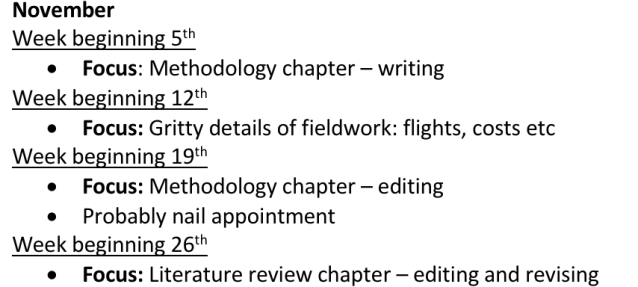
I use the ‘focus’ to determine my weekly tasks.
Weekly Planning
Every Friday afternoon I have time allocated to plan my week and to clean my desk. On this Friday afternoon I plan the next week. I usually put in my commitments first (I use outlook to track meetings and appointments), schedule time for reading and then look at my focus for the week and add tasks to achieve that. Here is what it looks like (note: all names are pseudonyms) :
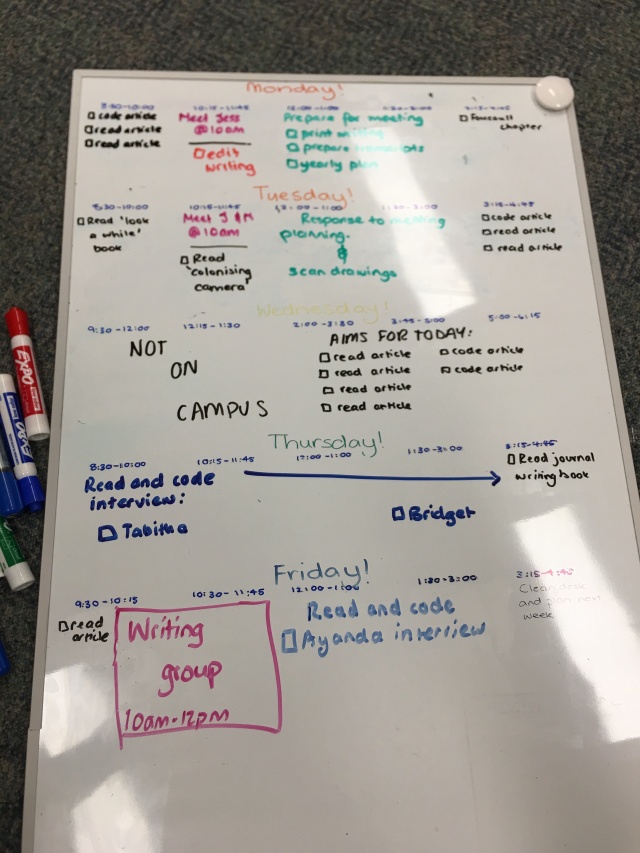
So my weekly planning is also daily planning, as I have allocated segments for each day. I have a set lunch break, and try to follow the 15 minute breaks in the middle segments. I’ve found that a large part of having success with this method is being strict with yourself. You have allocated these times for you to work, so work! Don’t pick up your phone unless it is in your allocated break. The same goes for Youtube, Twitter, Facebook etc. I treat my PhD like a full time job so I try to only work 8am-5pm, Monday-Friday. This doesn’t always happen, but I have found that it has given me less stress, and I value my time at my desk more. If you don’t set yourself hours it is easy to be unproductive as you can see the whole morning, day, then night stretch before you. If you know you only have until 5pm, you want to use all your time as productively as you can!
You also need to know what works for you, and when. For example, don’t schedule reading time in the morning if you know you hate reading in the morning! Try and be realistic about the tasks you can achieve, so you are setting yourself realistic goals. I have also found I am much better now at assessing how long a task will take, as I have practise at scheduling my time.
For those interested as to why I have ‘code article’ on my planning, this is because I use Nvivo for my literature review . Unfortunately when I had a computer malfunction, I lost some of my Nvivo file, so when I say ‘code article’ it really just means quickly grab the key quotes and fix them up in my Nvivo file.
Random things that pop up
One thing I found when I first started my PhD was that I had an ever growing to do list, and I had many suggestions from my supervisors of who to read, things to search for etc. I found the easiest solution for this was a visual to do list. I use post-it notes (cheap ones do not work – they fall off the wall) and have three columns, ‘to do’ ‘in progress’ and ‘done’.
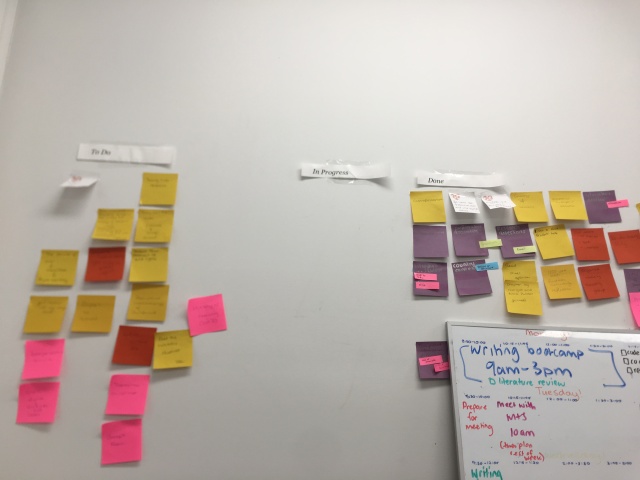
Sorry for the dreadful picture – my iPhone was trying to be arty by ‘focusing’ on one side and blurring the other. This list is different to my ‘monthly’ planning list. It is usually things that aren’t urgent, but I want to be able to remember for the future. I only have 1-3 items in the ‘in progress’ section at a time. This allows me to truly focus on the task at hand.
My desk as a whole
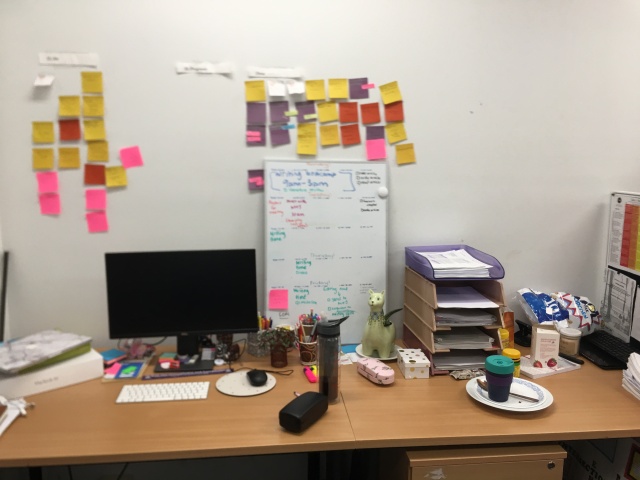
This is my desk overall. As you can see it isn’t super tidy, but I do like to keep some sort of order to it. To the right, I have my Gantt chart and my weekly tasks on the divider between my desk and the person next to me. The trays are for my printed articles, spare paper for notes, my de-identified transcripts, and papers that need to be filed on Friday. On the left, I have all of my printed articles sorted by subject. I keep most of my stationery in the drawers.
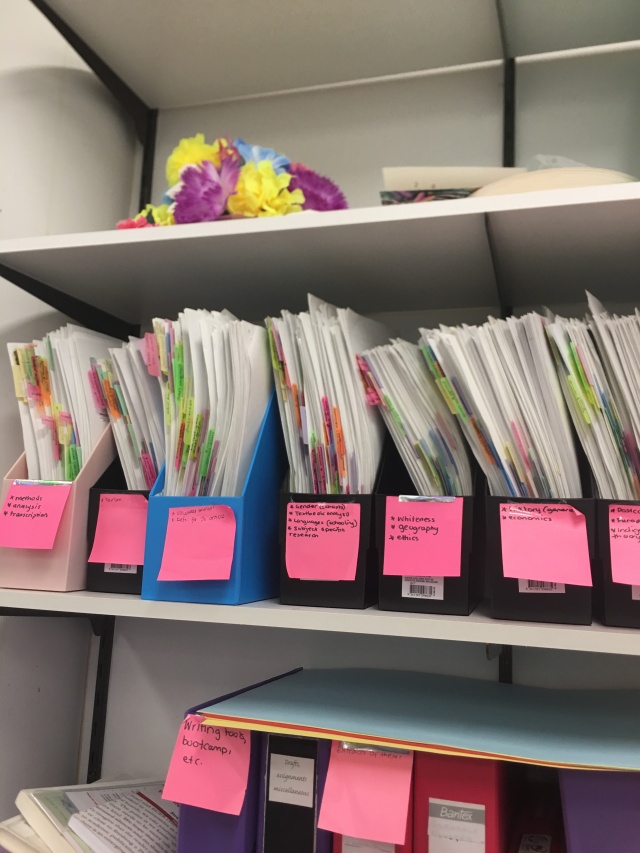
Below the magazine holders, I have folders. These are mainly filled with readings for courses I have taught and notes from workshops I have attended.
My calendar
I use my electronic calendar in Outlook as a way of managing my meetings and appointments. I do not schedule my tasks in the electronic calendar. It is only a tool to manage appointments/meetings. I have found this to be the most effective method for me, as I always generally have my phone with me. Paper planners (for me), always get left behind and I have a dreadful memory, so need something that I can quickly refer to.
Electronic organisation
People often ask me how I organise my files. For me this is simple.
- I have a folder for each potential chapter in my thesis, and organise drafts in here by date. Within each folder is a folder for feedback from my supervisors. Every time I open a document to write/edit, I ‘save as’ with a new date, to help track versions and eliminate any problems with file corruption (as I can always open the last saved file if a file corrupts)
- I have a folder for meeting notes. You should be planning your meeting with your supervisors, and I usually print an agenda prior to the meeting. I keep these here.
- I have a folder for ‘planning’. This includes my Gantt chart and my weekly lists.
- My PDFs are all organised in Nvivo, and I have a copy in Endnote. I simply save PDFs to my downloads – I do not need to organise them in another way on my computer.
- All my files are saved to my OneDrive. Except my Nvivo and Endnote files. The Nvivo file is constantly editing as you work in it, and cloud storage doesn’t like this. I save a back up to my cloud storage every time I close Nvivo. Endnote files will corrupt if they are saved on cloud/or USB storage. I use the ‘endnote’ online service to backup my Endnote.
- My notes and annotated bibliography are all in Scrivener ( see this post: The way I take notes for my PhD) .
For more tips, check out this tweet:
Going to be organising a workshop for PhD students about organisation skills/tricks/tips and goal setting. I know @raulpacheco has fantastic stuff. Does anyone have any tips/ organisational tools I can share beyond my own tips and things I do? #phd #phdchat — Dr Kate Smithers (@thekatsmithers) May 2, 2019
I hope this has helped you in some way! What are your tools for planning/organising?
Share this:
5 thoughts on “ how i plan in my phd/organise my desk ”.
Thank you very much for sharing your organising strategies. Your electronic organising I found particularly useful.
I’m glad it could be of use to you 🙂 I share what I have learnt in the hopes it will help somebody!
Pingback: Visualising tools in your PhD – Adventures of a PhD candidate
Pingback: Resources you can use as a PhD student – Adventures of a PhD candidate
Pingback: Six things you should know about the final year of the PhD journey! – Adventures of a PhD candidate
Leave a comment Cancel reply

- Already have a WordPress.com account? Log in now.
- Subscribe Subscribed
- Copy shortlink
- Report this content
- View post in Reader
- Manage subscriptions
- Collapse this bar
PhDLife Blog
Sharing PhD experiences across the University of Warwick and beyond
The Forgotten Skill: Organising your PhD Brain

The PhD journey can be complicated, hectic, and sometimes, feel like hell. A whirring, excited brain is great for research, but can be difficult to manage. Ellie King speaks about the often neglected skill of a PhD: organising your brain, and offers some tips on how to get things a bit neater.
Have you ever tried to remember every single thought you had during the last 3 years? Have you ever written an essay and thought ‘yes, that’s a great point I should make! Now, who was it who said it, and where the hell is it?!’ Have you ever thought the key to research success is being super smart? Welcome to the forgotten skill of your PhD: organising your thoughts.

This is something that isn’t much talked about within the research community. Yes, we look at time management and organisation skills, but have we ever stopped and thought about how we organise our minds? I’ve found that the background of a PhD is the constant whir of thinking: about where to go with an idea, about how to analyse data, about what to bring up in your next supervision. This whir needs to be turned into something manageable, because it’s no good when you’re writing your thesis to suddenly remember that idea you had two years ago and then wonder where it went. I always have thought of my PhD success not being driven by my intellect, but by being able to file and organise my constant stream of thoughts and manage to pick them out again eighteen months later.
Now, I’m quite an old-fashioned analogue person, so my method of organising my mind might seem weird. But you can definitely translate it into the 21 st century if that’s more your gig.

Firstly , the master notebook. It sounds pretty obvious but every time you have one of those thoughts, write it down. Put the date on it. If you think it’s really important, draw a box round it. If these ideas are in between your to-do lists and supervision notes, then that master notebook becomes a record of how your brain has ticked through research. My supervisor makes fun of me for being ‘the only person left in the world to still write things in notebooks’ but it has seriously helped.

Second , handling readings. You’ll probably all have your own methods for doing this, but with the amount of papers you take notes on, getting a system in early is a godsend. For me, yes you guessed it, I do all my notetaking on paper, but once a month I spend the time to log all of this into a bibliography excel spreadsheet. This includes all the publication information about the paper, but also space for a summary of what the paper said, any key quotes or words, and some notes on what I thought of the paper. Super useful for when you need to get to a paper or an idea but you can’t quite remember who said it or where it came from. Ctrl+F, and bingo.
Thirdly , general computer organisation. Those emails? Get them filed. Those file names: get them more specific than ‘research draft’. Use file folders effectively, splitting work into planning, publications, drafts, reading lists, whatever else you need. The more broken down the better in my opinion, otherwise you’re stuck trying to find ‘research draft’ within a file of fifty of the things.
I really believe that if you’ve got your office in order, whether that’s physical, digital, or metaphorical, you’ll have a much easier time on this difficult PhD train. Instead of research being a daunting mass of hell (and we all know it sometimes feels like this) it can become a little bit more manageable if that hell is neatly organised into boxes that you can easily get to when you need them. If you’re tracking every thought, every to-do list, every meeting, every paper you’ve read, then the train may run a little smoother.
How do you manage your hectic PhD brain? Tweet us at @ResearchEx , email us at [email protected], or leave a comment below.
Ellie King is a Second Year PhD student in Warwick Manufacturing Group. She has been at Warwick since 2014 in the History department, and has recently moved faculties to research applying user experience to the museum sector. Ellie is partnered with the Oxford University Museum of Natural History. You can connect with her on LinkedIn here , or follow her on Twitter @ellietheking
Share this:
One thought on “ the forgotten skill: organising your phd brain ”.
Ellie, thank you, this is really excellent advice, especially for people starting out on the PhD. I wish I had read this at the beginning. Initially, I used to make notes that looked like Greek, when I tried to back to decipher them. It took me a long time, but for readings & notes, I eventually worked out how to get the best out of my referencing software Endnote. There I include notes, & include quotations with page numbers, & also add external documents of notes. On the point about notes, I found that as my thoughts and research developed, I needed to organise the files and folders differently. You are so right about how important it is to be able to find the things you remember.
Comments are closed.
Want the latest PhD Life posts direct to your inbox? Subscribe below.
Type your email…
Blog at WordPress.com.

- Already have a WordPress.com account? Log in now.
- Subscribe Subscribed
- Copy shortlink
- Report this content
- View post in Reader
- Manage subscriptions
- Collapse this bar
- Home »
- Advice »
- Studying For A PhD
find your perfect postgrad program Search our Database of 30,000 Courses
Phd preparation top tips, tip #1 practice your organisational skills and time management.
To be a PhD student means to be your own boss, at least in terms of planning your own working hours and managing your research project. To be your own boss sounds great, but it can also be overwhelming unless you are prepared for the challenges it takes. You need to make sure you’re ready before your course starts by finding out what type of work schedule makes you most productive and able to stay inspired. In short you need to learn how to be your own boss and ensure you stay motivated!
TIP #2 Get your academic skills in shape
Top sportsmen need strong muscles to perform their chosen sport at the highest level, and PhD students need a strong brain for their studies. You can’t start a PhD without sending your brain to the gym first and getting it into shape! Reading books about your academic subject is like lifting weights, and the more you read the more prepared you will be!

If you have recently finished your graduate studies, it is highly likely that your academic skills are in good shape because you spent the previous year devouring numerous books and articles about your subject. In this case you are probably ready to begin your PhD – but don’t forget to do some reading during the summer break!
If you opted to take a gap year or have been working for a few years before starting your PhD, your academic fitness may be at a low level. If this instance we advise you to get back into shape while waiting for the beginning of your studies by taking a few hours each day to read academic texts relevant to your potential PhD topic. Staying mentally active is the secret to a long and happy academic life!
TIP #3 Create a Plan B
When it comes to PhD, Plan A doesn’t always work. Sometimes your research won’t go as planned, sometimes you will feel completely uninspired, and various other issues that you’ve never even thought of may arise for you to deal with. This means it is always a good idea to create a Plan B! Think about the possible issues that might arise during your PhD and work out how you could solve them.
TIP #4 Don’t forget to have fun

TIP #5 Learn how to work in a group and how to take criticism
As a PhD student, you will be a part of a small research group usually consisting of your supervisor and a few other students, which means you’ll need to learn how to work as a team. You will also be expected to give constructive criticisms as well as receive constructive criticism. If you’ve never experienced someone criticising your work before, you almost certainly will during your first PhD year. Thus you need to “desensitise” your ego and you can do this by undertaking short-term projects that will make you think from multiple perspectives and put you in the firing line for some criticism.
TIP #6 Read personal experiences of other PhD students
The best way to learn what it takes to be a successful PhD student and to prepare for the start of your course is to read personal experiences of other PhD students or to talk to your friends who have already experienced what it takes to do a PhD. This is especially important if you did your undergrad or masters degree in a different country and you don’t know what to expect when coming to the UK.
TIP #7 Follow what is happening inside your field
It wouldn’t make any sense to enter deep into a specialised field of study before finding out who’s who in your chosen area. Make sure you get to know who the most prominent researchers in your field are, what specific topics they are interested in, and which universities they work at. You may also wish to establish some contacts with these celebrated academics to give you a career boost should you ever decide to become an academic.
TIP #8 Practice self-motivation
If you were a graduate student or you had a “real job” for several years before starting the PhD, it is highly likely that you were constantly bombarded with specific projects to finish and that the feedback from your professors or your boss helped you remain inspired and set new challenges for yourself. However, during your PhD studies the external sources of inspiration will vanish, and you will need to master the art of inspiring yourself. You don’t need to be a genius to learn how to motivate yourself – it’s actually fairly simple. Before starting your PhD, try to constantly give yourself some short-term projects that require persistence and self-determination to get you into the swing of things. This will make you ready to aim even higher when your PhD course starts.
TIP #9 Focus on long term goals instead of short-term pleasures

TIP #10: Work on your language skills.
Last but not least, if you are a foreign student it is important that your English is on a high enough level before you begin your studies. Of course, in order to get accepted to your program you have probably passed the TOEFL or IELTS language tests. But don’t fool yourself! Passing these exams doesn’t necessarily mean that your academic English is at a high enough level to guarantee your success in your PhD . Most universities offer language courses for the upcoming PhD students before the start of the academic year, and that is one of the best ways to improve your English. Another useful thing to do is to surf the internet for various writing tips, and you can also contact university writing centres for more information or advice.
Related articles
Dos and Don'ts of a PhD Interview
Are You Ready For A PhD?
How To Get The Most From Your PhD Supervisor
Common PhD Myths
Alphabet of PhD Study
Top Tips for Surviving a PhD
Things To Ask When Looking For A PhD
Best Things About Doing a PhD
Pros And Cons Of Getting A PhD
To PhD Or Not To PhD
The Dos And Don'ts Of A PhD Interview

Exclusive bursaries Open day alerts Funding advice Application tips Latest PG news
Sign up now!

Take 2 minutes to sign up to PGS student services and reap the benefits…
- The chance to apply for one of our 5 PGS Bursaries worth £2,000 each
- Fantastic scholarship updates
- Latest PG news sent directly to you.
Stack Exchange Network
Stack Exchange network consists of 183 Q&A communities including Stack Overflow , the largest, most trusted online community for developers to learn, share their knowledge, and build their careers.
Q&A for work
Connect and share knowledge within a single location that is structured and easy to search.
How to organize my papers and notes from the beginning of my PhD? [duplicate]
I'm a first year PhD student.
I'm in my first stage (doing a literature review) but I face problem in organizing the papers I read and the notes I take for all papers. Should I put all that in one MS Word file for example, or different MS word files, or maybe use a different software?
I don't want to come after month from now and get confused about the way I organize my papers and notes in.
So, any helpful ideas?
- document-organization
- 3 Evernote + Mendeley works for me. – Shion Commented Sep 15, 2013 at 0:09
- 1 There is also some mind map software that lets you create nice graphs/trees so you can nicely group ideas and notes from papers. I never used those though. I use Evernote where I tag every post I make. Then I search through the tags to retrieve stuff. – Rabbit Commented Sep 15, 2013 at 0:31
- 1 I use FreeMind for mind mapping – user7130 Commented Sep 15, 2013 at 0:40
- 1 You might want to take a look at this question – Rabbit Commented Sep 15, 2013 at 0:43
- 1 Very broad and subjective/open-ended. There are lots of different ways of organizing papers and notes, but we can hardly know what is best for you. – F'x Commented Sep 15, 2013 at 13:40
4 Answers 4
First of all, a graduate school is a learning process so finding what is perfect from you from the start is a valiant endeavour but not necessarily sure fire.
You should start to use a data base system, some (mentioned in comments) that come to mind are Mendeley (free), EndNote (commercial), RefBase (free) to mention a few. If you consider going into LateX (which many of us swear by) then I can recommend JabRef (free; BibTeX format). There is also a Wikipedia comparison page that can be of assistance.
To sort your references concerns managing some form of structure where you group or "mind map your articles. In the old days you simply kept them in piles. With a data base software you can start providing key words in the data base and also keep some short notes for each paper which makes everything searchable and ready for sorting. I think the process or sorting articles is one that changes with different tasks and also persons so you are best of taking some advice from others and looking into it. Hopefully you also have peers around who can provide their insights. In the end you will develop your own set of tools that suit your needs and to keep trying different ones at an early stage, and discarding many of them, is far better than trying to do it later when the mass of information is much larger. Another option is to simply start using something and sticking with it regardless of weaknesses.
The bottom line is that with experience you will rely less and less on note-taking and be more efficient at seeing structure in what you read and so keeping a reference database is the main tool you will use. Even if this may not sound very constructive, I also say that the time you spend now on testing different solutions will pay back later, putting it off is only pushing problems forward.
A final personal note. If you want a free, platform independent, and completely versatile way to author documents you should look into LaTeX-writing (for example through TeX.stackexchange ). I recommend it to everyone unless you are in a complete Word-environment, being alone with a different system can be hard. You should nevertheless look into it.
- Love the LaTeX recommendation. – Penguin_Knight Commented Sep 20, 2013 at 17:59
I'm a first year myself, so I can't say "this works" so much as "this is what I'm trying"... But what I'm trying is using Zotero & Zotfile to hold notes on individual papers, and after reading each one I to try to fit it into a structure in a mind map (I use X-Mind).
I electronically highlight and comment my papers in the program Xournal. I used to then organize them somewhat in a program called Zotero (in some ways similar to the Mendeley mentioned above I believe). However, I recently stopped using Zotero because it was an additional hassle.
So currently I just mark up papers in Xournal and then organize them into different directories within my Dropbox account. I'm happy with this, and have been doing it for about 4 years now.
I used to use a journal to keep track of my readings as I could take the journal to the library with me. If I were doing a similar thing today, I'd use a wiki to keep track of my notes and research as that would let me re-organize things as needed, host PDFs of the journal articles when available and allow for searching.
- Ooh, I like the wiki idea... – Flyto Commented Sep 19, 2013 at 21:16
Not the answer you're looking for? Browse other questions tagged phd document-organization .
- Featured on Meta
- We spent a sprint addressing your requests — here’s how it went
- Upcoming initiatives on Stack Overflow and across the Stack Exchange network...
Hot Network Questions
- Scully’s foot fungus cream – A who-has-done-this crossword
- Using grout that had hardened in the bag
- Is infinity a number?
- Are there any reasons I shouldn't remove this odd nook from a basement room?
- How can I sort all levels except the innermost level?
- Adding outlets to a room via daisy chain using wiremold raceway
- How to delete an island whose min x less than -1
- How to find the axle kit for a Shimano front hub
- Negative kinetic energy on a step potential
- Can I exit România on a different passport than the one used for entering the country?
- Did any other European leader praise China for its peace initiatives since the outbreak of the Ukraine war?
- Unable to use split. tryed doing with align got more error in that also due to this im unable to fit the equation the page
- Which Präposition should I use with Erwartungen?
- Using register after multiplier in the MACC
- What scientifically plausible apocalypse scenario, if any, meets my criteria?
- Keyboard Ping Pong
- Sargent-Welch 1947 atomic model kit, design and use
- Switching Tenure-Track Positions Within Same University
- What enforcement exists for medical informed consent?
- Why do "dual frequency" or low frequency switching regulators exist when higher frequency is better?
- "Will make Elysian shades not too fair, too divine." in John Keats's "Lamia"
- Should I apologise to a professor after a gift authorship attempt, which they refused?
- Is this a Hadamard matrix?
- Does the damage from Thunderwave occur before or after the target is moved

- Youth Program
- Wharton Online
Wharton Stories
7 resources to help phd students succeed on their doctoral journey.
It takes a village and a variety of skills to succeed in the doctoral world. Here are a few of the many resources Wharton Doctoral Programs offers to help.
Like most of our doctoral students, perhaps you’re preparing to go into academia after completing your PhD. Being a professor and researcher today often involves opportunities to share your research with a larger audience than a classroom of students. The doctoral journey is meant to prepare you with the wide array of skills you’ll need to be effective whether you’re in front of the classroom or a conference stage.
That includes the polish to present and speak publicly with ease, the writing and communication skills to craft your dissertation and journal articles, the analytical know-how to research thoroughly and gather meaningful data, and the ability to teach — colleagues, pupils, or the general public, whatever the case may be. And, if you have family, you’ll need support in getting them through this journey with you.
Wharton Doctoral Programs offers a wide range of resources to help you thrive in the PhD program and prepare you for life beyond it. Here are a few of the top Wharton resources our students have highlighted as most beneficial:
1. 5 Slides 5 Minutes
Researchers often have the opportunity to share their work with a larger audience through social media and mass media outlets — but it requires nuanced communication skills. How do you take complex findings and communicate them to a general audience concisely without oversimplifying the message?
That’s the focus of 5 Slides 5 Minutes. Launched in 2014, this low-stakes, high-potential event enables PhD students to present an abstract to students, faculty, and staff to practice engaging non-experts in their research topic. Students receive an invitation to participate via email from the Doctoral Programs Office.
After students present, they can work with Wharton Communications Program to review their presentation and get tips on how to improve their communication skills. Wharton’s renowned faculty also share valuable insights with students about these presentations.
“We focus on individuals. We help them convey their research content most effectively given their style and personality,” said Lisa Warshaw, Director of the Wharton Communications Program.
2. Dissertation Boot Camp
The name might sound intimidating, but some students think of Dissertation Boot Camp as a two-week writers’ retreat. Hosted twice a year by the Graduate Student Center, it’s designed for students who have dissertation status but haven’t presented their proposal yet.
The camp offers an environment and support for intense, focused writing time as well as a review on the steps, deadlines, and University policies. Limited to 20 students, the small group gives writers a chance to make connections with others who are going through the dissertation process and provides participants with the structure and motivation to overcome typical roadblocks along the way.
3. Wharton Communications Program
The Wharton Communication Program helps Wharton PhD students become more effective communicators and thus better presenters, public speakers, and writers — all critical skills in academia. All doctoral students are provided with access to on-site, one-on-one writing coaching during the academic year.
Wharton PhD students are required to attend two workshops: First-Year Communications Workshop in the fall and First-Year Writing Workshop in the spring. The skills-based approach adopted in the workshops helps students develop their personal style and strengthen their confidence as communicators.
Through multiple practice opportunities, video recording of speeches, and rigorous feedback, the program provides students with a thorough foundation in communication theory and for doctoral students, focuses on research presentations and job talks.
4. Teacher Development Program Workshop
Offered in conjunction with the Center for Teaching and Learning , the Teacher Development Program is a four-session course. It gives doctoral students a foundation in core teaching practices to support their teaching at Penn.
By helping with presentation skills and academic job placement, the workshop prepares students to become faculty in the future. Ian Petrie , Senior Associate Director, Center for Teaching and Learning described the workshop as “a collective, collaborative program.” Each week features “microteaching” demonstrations, where participants conduct a brief lesson and get feedback from their peers and the directors.
The intent is that faculty and graduate students will engage and learn from each other to master fundamental teaching methods. “Every PhD student can leave the program having gained some new tools for teaching,” Petrie said. This exchange happens when doctoral students observe “talented colleagues from other departments to get a glimpse of how they teach.”
Students also have the opportunity to enroll in the CTL Teaching Certificate program to hone teaching skills and grasp a commitment to developing as teachers.
“I’d like everyone to come out of the experience feeling more confident about their skills as an instructor or presenter,” Petrie said. “Anything I can do to support doctoral students in achieving their goals is extremely gratifying.”
5. Wharton Research Data Services (WRDS)
With more than 50,000 corporate, academic, and government users, Wharton Research Data Services (WRDS) is the global gold standard in data management, research analytics, and thought leadership. Researchers at more than 450 institutions in 36 countries across the globe depend upon this award-winning research platform and business intelligence tool — and researchers are doing the work to grow it right here on Wharton’s campus.
“The fact that the people who create the data, research analytics, and tools are here is super important,” said Prof. Cathy Schrand, Vice Dean of Wharton Doctoral Programs. “I’ve had early access to WRDS before it even became available to other subscribers. Top universities all over the world that have subscriptions to WRDS may only have access to certain elements of it, but we have access to all of it and it’s here on site which does provide an advantage.” The platform allows researchers to access more than 350 terabytes of data in one location that spans across multiple disciplines, including accounting, banking, economics, ESG (environmental, social, and governance), finance, health care, insurance, marketing, and statistics. “WRDS is by far the most important source of datasets for academic researchers. As a Wharton PhD student, you automatically get unrestricted access to every one of these databases,” said Itamar Drechsler, associate professor of finance at Wharton and NYU’s Stern School of Business, who has experience on both sides of the classroom – he earned his PhD from Wharton in 2009.
6. Wharton Behavioral Lab
A shared resource for all Wharton faculty, the Wharton Behavioral Laboratory (WBL) provides a variety of services that support data collection for behavioral research on business-related topics. The primary goal is to enhance the research productivity of Wharton faculty by minimizing the operational costs, both time and money, of conducting research. With two locations — one in Steinberg Hall Dietrich Hall and another in Jon Huntsman Hall, doctoral students can gather original data through lab experiments and panels, instead of using secondary data created by others. Each year, the lab collects about 23,000 subject hours of data. Research from WBL can consistently be found in national and international publications such as the Journal of Behavioral Decision Making, the Journal of Experimental Psychology: General, Proceedings of the National Academy of Sciences, the Journal of Neuroscience, Psychology, and Economics, and the Journal of Business Ethics .
7. Support for Families
For some PhD students, attending Wharton means relocating their families to a new city. To help students and their families ease the transition to PhD life, the Wharton Doctoral Program Office hosts the Maternity/Paternity Workshop , an annual event that talks about the resources available to PhD students with families.
Here are a couple of the key resources they highlight in the workshop:
- The Doctoral Programs Office allows eligible students to apply for up to one year of additional school-level funding beyond their allotted funded year. Furthermore, students are eligible for up to eight weeks of time-off for childbirth and adoption and have the option of taking unpaid Family Leave of Absence.
- At Penn, the Family Resource Center provides additional resources and facilities, such as a children’s playroom and two private lactation rooms, which cater to the needs of students with families. The Center also has two grant programs for PhD students to help offset the cost of childcare and family expenses, and health insurance for dependents.
- Wharton Doctoral Partners & Families is a student-run online resource created to communicate the resources at Penn and Philadelphia to partners and families. Its mission is to empower members to transition and settle into their new lives.
Posted: November 6, 2018
- Admissions and Applying
- The Wharton School
- Work/Life Balance
Doctoral Programs
Start your doctoral journey.
Whether you’re just starting your research on PhD programs or you’re ready to apply, we’ll walk you through the steps to take to become a successful PhD candidate.
Deciding to get a PhD
You might be surprised to find out what you can do with a PhD in business.
Is an Academic Career for You ? What Makes a Successful PhD Student
Preparing for the Doctoral Path
The skills, relationships, and knowledge you need to prepare yourself for a career in academics.
How the PhD Program Works How to Become a Successful PhD Applicant
Choosing the right program
What’s the difference between PhD programs? Find out how to choose one that fits your goals.
What to Consider When Choosing a Doctoral Program
Starting an application
Tips for a successful application process.
Application Requirements Preparing Your PhD Application
Related Content

How This Wharton Undergraduate Followed His Love of Sustainability to the Galapagos

From Tom Brady to Philly’s Soda Tax: Prof. Diana Robertson Brings Real-World Business Ethics into the Classroom

Bright Idea: An Eco-Friendly, Affordable Lighting Solution Wins the 2020 Y-Prize

Wharton Research Data Services Makes Big Data Digestible

Wharton EMBA Program is a “Transformational Experience”

How This Tech Industry Expert Found Value in Wharton’s MBA Program for Executives

How this Dad Balanced Wharton, Work, and Young Kids

How Prof. Stephanie Creary Works Towards Inclusion in Research, Teaching, and Wharton Culture

How a Wharton MBA Cluster Is Built

Wharton’s PhD Program Prepared This Doctor to Perform Economic Evaluations in Health Care

Why I Chose Wharton EMBA
![From Sponsorship to Loans: Financing Your Wharton MBA [Webinar] phd organization tips](https://dca.wharton.upenn.edu/wp-content/uploads/fin-aid-webinar-video-300x115.jpg)
From Sponsorship to Loans: Financing Your Wharton MBA [Webinar]

Kiersa Sanders: Beating the Odds and Finding Community

How this Orthopedic Surgeon and Father of Seven Balances School, Work, and Family


Prof. Corinne Low Teaches Business Principles to Wharton MBAs and Zambian 8th Graders
- Share on twitter
- Share on facebook
Essential PhD tips: 10 articles all doctoral students should read
Phd advice: from choosing the right topic to getting through your thesis.
- Share on linkedin
- Share on mail

If you’re still deciding whether to study for a doctorate, or even if you’re nearing the end of your PhD and are thinking about your next steps, we’ve selected 10 articles that you really should take a look at.
They cover everything from selecting your topic to securing a top job when your years of hard graft come to an end.
14 essential PhD questions answered Welcome to the Times Higher Education PhD surgery with Tara Brabazon, professor of education at Charles Sturt University , Australia.
The PhD experience: this far, and no further Five students on how doctoral study changed them and their futures.
10 steps to PhD failure Top tips on making postgraduate study even tougher (which students could also use to avoid pitfalls if they prefer).
How not to write a PhD thesis If you want failure, this is your road map to getting there.
Realistic expectations keep you on the path to a PhD Isolation is part of the experience, but peer support groups and co-working can combat loneliness and quell students’ self-doubt.
10 truths a PhD supervisor will never tell you There are some important dos and don’ts to bear in mind when choosing someone to oversee your doctoral thesis.
Me and my PhD supervisor: tales of love and loathing Academics discuss how supervisors shaped their teaching.
How to get students through their PhD thesis Tara Brabazon shares her 10-step regime for steering emotionally drained postgraduate students through the final stages of their thesis.
Choosing a PhD subject A well-chosen doctoral thesis will have a focus that can be explored in the appropriate time and built on in the future.
How to get ahead with a PhD Postgraduates do not to realise how employable they are. Pat Cryer explains how to get a well-paid job.
Read next: visit the THE PhD advice page
Register to continue.
Why register?
- Registration is free and only takes a moment
- Once registered, you can read 3 articles a month
- Sign up for our newsletter
Or subscribe for unlimited access to:
- Unlimited access to news, views, insights & reviews
- Digital editions
- Digital access to THE’s university and college rankings analysis
Already registered or a current subscriber? Login
You might also like

Embed impact in PhD training from day one, says UCL doctoral head
Head of UK’s biggest PhD school says promoting impact in doctoral studies would make students more employable and research more visible

Most PhD students with hidden disabilities ‘unhappy with support’
Postgraduate researchers with non-visible disabilties often struggle to access proper employee-type support, says University and College Union report

PhDs for everyone will not improve academia
Ever-expanding numbers of doctoral students may suit universities, but one’s twenties should be a time for broad learning and professional development, not for burying oneself in detailed research, says Lincoln Allison
Featured jobs
- Harvard Business School →
- Doctoral Programs →
- PhD Programs
- Accounting & Management
- Business Economics
- Health Policy (Management)
Organizational Behavior
- Technology & Operations Management
- Program Requirements
Scholars in the doctoral program in Organizational Behavior at Harvard Business School are prepared to pursue an interdisciplinary inquiry into issues that are broadly related to the functioning of individuals within groups, at either the micro or macro level. Graduates of our program go on to become the leading researchers and thinkers in organizational behavior, shaping the field and advancing theoretical understanding in posts at schools of management or in disciplinary departments.
The Organizational Behavior program is jointly administered by the faculty of Harvard Business School and the Department of Sociology in the Faculty of Arts and Sciences, and students have the opportunity to work with faculty from both the Faculty of Arts and Sciences and Harvard Business School.
Curriculum & Coursework
Our program offers two distinct tracks, with research focused either on the micro or macro level. Students who choose to focus on micro organizational behavior take a psychological approach to the study of interpersonal relationships within organizations and groups, and the effects that groups have on individuals. In macro organizational behavior, scholars use sociological methods to examine the organizations, groups, and markets themselves, including topics such as the influence of individuals on organizational change, or the relationship between social missions and financial objectives.
Your core disciplinary training will take place in either the psychology or sociology departments, depending on the track that you choose. You will also conduct advanced coursework in organizational behavior at HBS, and complete two MBA elective curriculum courses. Students are required to teach for one full academic term in order to gain valuable teaching experience, and to work as an apprentice to a faculty member to develop research skills. Upon completion of coursework, students prepare and present a dossier that includes a qualifying paper, at least two other research papers, and a statement outlining a plan for their dissertation. Before beginning work on the dissertation, students must pass the Organizational Behavior Exam, which presents an opportunity to synthesize academic coursework and prepare for an in-depth research project.
Research & Dissertation
Examples of doctoral thesis research.
- Cross-group relations, stress, and the subsequent effect on performance
- Internal group dynamics of corporate boards of directors
- Organizational mission and its effect on commitment and effort
- Psychological tendencies and collaboration with dissimilar others

Aurora Turek

Justine Murray

Jaylon Sherrell
“ In HBS’s Organizational Behavior program I receive outstanding, rigorous training in disciplinary methods and also benefit from the myriad resources that HBS has to offer. HBS scholars are looking to apply their research to real-world problems, come up with interventions, and make a real difference. ”

Current Harvard Sociology & Psychology Faculty
- George A. Alvarez
- Mahzarin R. Banaji
- Jason Beckfield
- Lawrence D. Bobo
- Mary C. Brinton
- Joshua W. Buckholtz
- Randy L. Buckner
- Alfonso Caramazza
- Susan E. Carey
- Paul Y. Chang
- Mina Cikara
- Christina Ciocca Eller
- Christina Cross
- Fiery Cushman
- Frank Dobbin
- Samuel J. Gershman
- Daniel Gilbert
- Joshua D. Greene
- Jill M. Hooley
- Rakesh Khurana
- Alexandra Killewald
- Talia Konkle
- Max Krasnow
- Michèle Lamont
- Ellen Langer
- Joscha Legewie
- Ya-Wen Lei
- Patrick Mair
- Peter V. Marsden
- Katie A. McLaughlin
- Richard J. McNally
- Jason P. Mitchell
- Ellis Monk
- Matthew K. Nock
- Orlando Patterson
- Elizabeth A. Phelps
- Steven Pinker
- Robert J. Sampson
- Daniel L. Schacter
- Theda Skocpol
- Mario L. Small
- Jesse Snedeker
- Leah H. Somerville
- Elizabeth S. Spelke
- Tomer D. Ullman
- Adaner Usmani
- Jocelyn Viterna
- Mary C. Waters
- John R. Weisz
- Christopher Winship
- Xiang Zhou
Current HBS Faculty
- Julie Battilana
- Max H. Bazerman
- David E. Bell
- Ethan S. Bernstein
- Alison Wood Brooks
- Edward H. Chang
- Julian De Freitas
- Amy C. Edmondson
- Robin J. Ely
- Alexandra C. Feldberg
- Carolyn J. Fu
- Amit Goldenberg
- Boris Groysberg
- Ranjay Gulati
- Linda A. Hill
- Nien-he Hsieh
- Jon M. Jachimowicz
- Summer R. Jackson
- Leslie K. John
- Jillian J. Jordan
- Rakesh Khurana
- Hyunjin Kim
- Joshua D. Margolis
- Edward McFowland III
- Kathleen L. McGinn
- Tsedal Neeley
- Michael I. Norton
- Leslie A. Perlow
- Jeffrey T. Polzer
- Ryan L. Raffaelli
- Lakshmi Ramarajan
- James W. Riley
- Clayton S. Rose
- Arthur I Segel
- Emily Truelove
- Michael L. Tushman
- Ashley V. Whillans
- Letian Zhang
- Julian J. Zlatev
Current Organizational Behavior Students
- Jennifer Abel
- Yajun Cao
- Grace Cormier
- Megan Gorges
- Bushra Guenoun
- Elizabeth Johnson
- Caleb Kealoha
- Kai Krautter
- Justine Murray
- C. Ryann Noe
- Elizabeth Sheprow
- Jaylon Sherrell
- Yoon Jae Shin
- Erin Shirtz
- Samantha N. Smith
- Tiffany Smith
- Channing Spencer
- Yuval Spiegler
- Emily Tedards
- Aurora Turek
Current HBS Faculty & Students by Interest
Recent placement, hanne collins, 2024, evan defilippis, 2023, hayley blunden, 2022, lumumba seegars, 2021, karen huang, 2020, stefan dimitriadis, 2019, elizabeth hansen, 2019, julie yen, 2024, jeff steiner, 2023, ahmmad brown, 2022, yanhua bird, 2020, jeffrey lees, 2020, alexandra feldberg, 2019, martha jeong, 2019, nicole abi-esber, 2023, elliot stoller, 2023, ariella kristal, 2022, leroy gonsalves, 2020, alicia desantola, 2019, catarina fernandes, 2019.
About Stanford GSB
- The Leadership
- Dean’s Updates
- School News & History
- Commencement
- Business, Government & Society
- Centers & Institutes
- Center for Entrepreneurial Studies
- Center for Social Innovation
- Stanford Seed
About the Experience
- Learning at Stanford GSB
- Experiential Learning
- Guest Speakers
- Entrepreneurship
- Social Innovation
- Communication
- Life at Stanford GSB
- Collaborative Environment
- Activities & Organizations
- Student Services
- Housing Options
- International Students
Full-Time Degree Programs
- Why Stanford MBA
- Academic Experience
- Financial Aid
- Why Stanford MSx
- Research Fellows Program
- See All Programs
Non-Degree & Certificate Programs
- Executive Education
- Stanford Executive Program
- Programs for Organizations
- The Difference
- Online Programs
- Stanford LEAD
- Seed Transformation Program
- Aspire Program
- Seed Spark Program
- Faculty Profiles
- Academic Areas
- Awards & Honors
- Conferences
Faculty Research
- Publications
- Working Papers
- Case Studies
Research Hub
- Research Labs & Initiatives
- Business Library
- Data, Analytics & Research Computing
- Behavioral Lab
Research Labs
- Cities, Housing & Society Lab
- Golub Capital Social Impact Lab
Research Initiatives
- Corporate Governance Research Initiative
- Corporations and Society Initiative
- Policy and Innovation Initiative
- Rapid Decarbonization Initiative
- Stanford Latino Entrepreneurship Initiative
- Value Chain Innovation Initiative
- Venture Capital Initiative
- Career & Success
- Climate & Sustainability
- Corporate Governance
- Culture & Society
- Finance & Investing
- Government & Politics
- Leadership & Management
- Markets and Trade
- Operations & Logistics
- Opportunity & Access
- Technology & AI
- Opinion & Analysis
- Email Newsletter
Welcome, Alumni
- Communities
- Digital Communities & Tools
- Regional Chapters
- Women’s Programs
- Identity Chapters
- Find Your Reunion
- Career Resources
- Job Search Resources
- Career & Life Transitions
- Programs & Webinars
- Career Video Library
- Alumni Education
- Research Resources
- Volunteering
- Alumni News
- Class Notes
- Alumni Voices
- Contact Alumni Relations
- Upcoming Events
Admission Events & Information Sessions
- MBA Program
- MSx Program
- PhD Program
- Alumni Events
- All Other Events
- Requirements
- Requirements: Behavioral
- Requirements: Quantitative
- Requirements: Macro
- Requirements: Micro
- Annual Evaluations
- Field Examination
- Research Activities
- Research Papers
- Dissertation
- Oral Examination
- Current Students
- Entering Class Profile
- Education & CV
- GMAT & GRE
- International Applicants
- Statement of Purpose
- Letters of Recommendation
- Reapplicants
- Application Fee Waiver
- Deadline & Decisions
- Job Market Candidates
- Academic Placements
- Stay in Touch
- Fields of Study
- Student Life
- Organizational Behavior
In the field of organizational behavior we research fundamental questions about the behavior of individuals, groups and organizations, from both psychological and sociological perspectives.
A distinguishing feature of Stanford’s PhD Program in organizational behavior is the broad interdisciplinary training it provides. Our students benefit from their interactions with scholars from many disciplines within the Graduate School of Business, as well as from Stanford University’s long-standing strength in the study of psychology, organizations, and economic sociology. The program is broken down into two broad subareas: Macro Organizational Behavior and Micro Organizational Behavior .
Cross-registration in courses, access to faculty, and participation in colloquia are available in other Stanford departments, such as sociology and psychology . Strong relations with these departments mean that students can build their careers on the foundation of strong disciplinary training in psychology and sociology, respectively.
A small number of students are accepted into the program each year, with a total of about 20 organizational behavior students in residence.
The doctoral program places a heavy emphasis on training students through active engagement in the process of doing research. In addition to formal seminars with invited presenters, our faculty and students exchange research ideas and advice at informal weekly lunches and lab meetings. Students work as research assistants and are expected to conduct independent research early in the program.
Macro Organizational Behavior: Organizational Theory and Economic Sociology
The Macro OB track is dedicated to training students who will be leading researchers in the fields of organizational theory and economic sociology. Our faculty members are among the foremost scholars who bring a sociological approach to the study of organizations and markets.
The training provides a deep grounding in the study of:
- Organizations as social systems
- The dynamics of change in organizations
- Industries and markets
- The relationships between organizations and their environments
Faculty study a range of topics, such as:
- The role of identity and categories in organizational processes
- Organizational culture and its dynamics
- Change in cultural categories and markets
- Social movements and their influence on firms and markets
- Firm strategies and the effects of long-run histories of strategic interaction
- The impact of workforce demographic change and labor market inequality
- Organizational learning processes
- Social networks
- Entrepreneurship and firm formation processes
Micro Organizational Behavior
The study of how individuals and groups affect and are affected by organizational context. Drawing primarily on psychological approaches to social science questions, this area includes such topics as:
- Decision-making
- Moral judgment
- Social norms
- Negotiation and bargaining
- Cooperation and altruism
- Group processes
- Stereotyping and injustice
- Personality
- Power, status and influence
There is also a formal institutional link between the behavioral side of marketing and the micro side of organizational behavior, which is called the Behavioral Interest Group. The Stanford GSB Behavioral Lab links members of this group. This lab supports work across field boundaries among those with behavioral interests.
Preparation and Qualifications
All students are required to have, or to obtain during their first year, mathematical skills at the level of one course each of calculus and linear algebra, probability, and mathematical statistics.
Macro Organizational Behavior Faculty
William p. barnett, robert a. burgelman, glenn r. carroll, julien clement, amir goldberg, helena miton, hayagreeva rao, sarah a. soule, jesper b. sørensen, micro organizational behavior faculty, justin m. berg, jennifer eberhardt, francis j. flynn, michele j. gelfand, deborah h. gruenfeld, michal kosinski, brian s. lowery, ashley martin, david melnikoff, dale t. miller, benoît monin, charles a. o’reilly, jeffrey pfeffer, emeriti faculty, michael t. hannan, roderick m. kramer, joanne martin, margaret ann neale, jerry i. porras, recent publications in organizational behavior, social norm change: drivers and consequences, bayesianism and wishful thinking are compatible, changes in social norms during the early stages of the covid-19 pandemic across 43 countries, recent insights by stanford business, your summer 2024 podcast playlist, why investors throw money at eccentric ceos, psst — wanna know why gossip has evolved in every human society.
- Priorities for the GSB's Future
- See the Current DEI Report
- Supporting Data
- Research & Insights
- Share Your Thoughts
- Search Fund Primer
- Teaching & Curriculum
- Affiliated Faculty
- Faculty Advisors
- Louis W. Foster Resource Center
- Defining Social Innovation
- Impact Compass
- Global Health Innovation Insights
- Faculty Affiliates
- Student Awards & Certificates
- Changemakers
- Dean Jonathan Levin
- Dean Garth Saloner
- Dean Robert Joss
- Dean Michael Spence
- Dean Robert Jaedicke
- Dean Rene McPherson
- Dean Arjay Miller
- Dean Ernest Arbuckle
- Dean Jacob Hugh Jackson
- Dean Willard Hotchkiss
- Faculty in Memoriam
- Stanford GSB Firsts
- Class of 2024 Candidates
- Certificate & Award Recipients
- Dean’s Remarks
- Keynote Address
- Teaching Approach
- Analysis and Measurement of Impact
- The Corporate Entrepreneur: Startup in a Grown-Up Enterprise
- Data-Driven Impact
- Designing Experiments for Impact
- Digital Marketing
- The Founder’s Right Hand
- Marketing for Measurable Change
- Product Management
- Public Policy Lab: Financial Challenges Facing US Cities
- Public Policy Lab: Homelessness in California
- Lab Features
- Curricular Integration
- View From The Top
- Formation of New Ventures
- Managing Growing Enterprises
- Startup Garage
- Explore Beyond the Classroom
- Stanford Venture Studio
- Summer Program
- Workshops & Events
- The Five Lenses of Entrepreneurship
- Leadership Labs
- Executive Challenge
- Arbuckle Leadership Fellows Program
- Selection Process
- Training Schedule
- Time Commitment
- Learning Expectations
- Post-Training Opportunities
- Who Should Apply
- Introductory T-Groups
- Leadership for Society Program
- Certificate
- 2024 Awardees
- 2023 Awardees
- 2022 Awardees
- 2021 Awardees
- 2020 Awardees
- 2019 Awardees
- 2018 Awardees
- Social Management Immersion Fund
- Stanford Impact Founder Fellowships
- Stanford Impact Leader Prizes
- Social Entrepreneurship
- Stanford GSB Impact Fund
- Economic Development
- Energy & Environment
- Stanford GSB Residences
- Environmental Leadership
- Stanford GSB Artwork
- A Closer Look
- California & the Bay Area
- Voices of Stanford GSB
- Business & Beneficial Technology
- Business & Sustainability
- Business & Free Markets
- Business, Government, and Society Forum
- Get Involved
- Second Year
- Global Experiences
- JD/MBA Joint Degree
- MA Education/MBA Joint Degree
- MD/MBA Dual Degree
- MPP/MBA Joint Degree
- MS Computer Science/MBA Joint Degree
- MS Electrical Engineering/MBA Joint Degree
- MS Environment and Resources (E-IPER)/MBA Joint Degree
- Academic Calendar
- Clubs & Activities
- LGBTQ+ Students
- Military Veterans
- Minorities & People of Color
- Partners & Families
- Students with Disabilities
- Student Support
- Residential Life
- Student Voices
- MBA Alumni Voices
- A Week in the Life
- Career Support
- Employment Outcomes
- Cost of Attendance
- Knight-Hennessy Scholars Program
- Yellow Ribbon Program
- BOLD Fellows Fund
- Application Process
- Loan Forgiveness
- Contact the Financial Aid Office
- Evaluation Criteria
- English Language Proficiency
- Personal Information, Activities & Awards
- Professional Experience
- Optional Short Answer Questions
- Application Fee
- Reapplication
- Deferred Enrollment
- Joint & Dual Degrees
- Event Schedule
- Ambassadors
- New & Noteworthy
- Ask a Question
- See Why Stanford MSx
- Is MSx Right for You?
- MSx Stories
- Leadership Development
- How You Will Learn
- Admission Events
- Personal Information
- GMAT, GRE & EA
- English Proficiency Tests
- Career Change
- Career Advancement
- Daycare, Schools & Camps
- U.S. Citizens and Permanent Residents
- Faculty Mentors
- Current Fellows
- Standard Track
- Fellowship & Benefits
- Group Enrollment
- Program Formats
- Developing a Program
- Diversity & Inclusion
- Strategic Transformation
- Program Experience
- Contact Client Services
- Campus Experience
- Live Online Experience
- Silicon Valley & Bay Area
- Digital Credentials
- Faculty Spotlights
- Participant Spotlights
- Eligibility
- International Participants
- Stanford Ignite
- Frequently Asked Questions
- Operations, Information & Technology
- Political Economy
- Classical Liberalism
- The Eddie Lunch
- Accounting Summer Camp
- Videos, Code & Data
- California Econometrics Conference
- California Quantitative Marketing PhD Conference
- California School Conference
- China India Insights Conference
- Homo economicus, Evolving
- Political Economics (2023–24)
- Scaling Geologic Storage of CO2 (2023–24)
- A Resilient Pacific: Building Connections, Envisioning Solutions
- Adaptation and Innovation
- Changing Climate
- Civil Society
- Climate Impact Summit
- Climate Science
- Corporate Carbon Disclosures
- Earth’s Seafloor
- Environmental Justice
- Operations and Information Technology
- Organizations
- Sustainability Reporting and Control
- Taking the Pulse of the Planet
- Urban Infrastructure
- Watershed Restoration
- Junior Faculty Workshop on Financial Regulation and Banking
- Ken Singleton Celebration
- Marketing Camp
- Quantitative Marketing PhD Alumni Conference
- Presentations
- Theory and Inference in Accounting Research
- Stanford Closer Look Series
- Quick Guides
- Core Concepts
- Journal Articles
- Glossary of Terms
- Faculty & Staff
- Researchers & Students
- Research Approach
- Charitable Giving
- Financial Health
- Government Services
- Workers & Careers
- Short Course
- Adaptive & Iterative Experimentation
- Incentive Design
- Social Sciences & Behavioral Nudges
- Bandit Experiment Application
- Conferences & Events
- Reading Materials
- Energy Entrepreneurship
- Faculty & Affiliates
- SOLE Report
- Responsible Supply Chains
- Current Study Usage
- Pre-Registration Information
- Participate in a Study
- Founding Donors
- Location Information
- Participant Profile
- Network Membership
- Program Impact
- Collaborators
- Entrepreneur Profiles
- Company Spotlights
- Seed Transformation Network
- Responsibilities
- Current Coaches
- How to Apply
- Meet the Consultants
- Meet the Interns
- Intern Profiles
- Collaborate
- Research Library
- News & Insights
- Program Contacts
- Databases & Datasets
- Research Guides
- Consultations
- Research Workshops
- Career Research
- Research Data Services
- Course Reserves
- Course Research Guides
- Material Loan Periods
- Fines & Other Charges
- Document Delivery
- Interlibrary Loan
- Equipment Checkout
- Print & Scan
- MBA & MSx Students
- PhD Students
- Other Stanford Students
- Faculty Assistants
- Research Assistants
- Stanford GSB Alumni
- Telling Our Story
- Staff Directory
- Site Registration
- Alumni Directory
- Alumni Email
- Privacy Settings & My Profile
- Success Stories
- The Story of Circles
- Support Women’s Circles
- Stanford Women on Boards Initiative
- Alumnae Spotlights
- Insights & Research
- Industry & Professional
- Entrepreneurial Commitment Group
- Recent Alumni
- Half-Century Club
- Fall Reunions
- Spring Reunions
- MBA 25th Reunion
- Half-Century Club Reunion
- Faculty Lectures
- Ernest C. Arbuckle Award
- Alison Elliott Exceptional Achievement Award
- ENCORE Award
- Excellence in Leadership Award
- John W. Gardner Volunteer Leadership Award
- Robert K. Jaedicke Faculty Award
- Jack McDonald Military Service Appreciation Award
- Jerry I. Porras Latino Leadership Award
- Tapestry Award
- Student & Alumni Events
- Executive Recruiters
- Interviewing
- Land the Perfect Job with LinkedIn
- Negotiating
- Elevator Pitch
- Email Best Practices
- Resumes & Cover Letters
- Self-Assessment
- Whitney Birdwell Ball
- Margaret Brooks
- Bryn Panee Burkhart
- Margaret Chan
- Ricki Frankel
- Peter Gandolfo
- Cindy W. Greig
- Natalie Guillen
- Carly Janson
- Sloan Klein
- Sherri Appel Lassila
- Stuart Meyer
- Tanisha Parrish
- Virginia Roberson
- Philippe Taieb
- Michael Takagawa
- Terra Winston
- Johanna Wise
- Debbie Wolter
- Rebecca Zucker
- Complimentary Coaching
- Changing Careers
- Work-Life Integration
- Career Breaks
- Flexible Work
- Encore Careers
- Join a Board
- D&B Hoovers
- Data Axle (ReferenceUSA)
- EBSCO Business Source
- Global Newsstream
- Market Share Reporter
- ProQuest One Business
- Student Clubs
- Entrepreneurial Students
- Stanford GSB Trust
- Alumni Community
- How to Volunteer
- Springboard Sessions
- Consulting Projects
- 2020 – 2029
- 2010 – 2019
- 2000 – 2009
- 1990 – 1999
- 1980 – 1989
- 1970 – 1979
- 1960 – 1969
- 1950 – 1959
- 1940 – 1949
- Service Areas
- ACT History
- ACT Awards Celebration
- ACT Governance Structure
- Building Leadership for ACT
- Individual Leadership Positions
- Leadership Role Overview
- Purpose of the ACT Management Board
- Contact ACT
- Business & Nonprofit Communities
- Reunion Volunteers
- Ways to Give
- Fiscal Year Report
- Business School Fund Leadership Council
- Planned Giving Options
- Planned Giving Benefits
- Planned Gifts and Reunions
- Legacy Partners
- Giving News & Stories
- Giving Deadlines
- Development Staff
- Submit Class Notes
- Class Secretaries
- Board of Directors
- Health Care
- Sustainability
- Class Takeaways
- All Else Equal: Making Better Decisions
- If/Then: Business, Leadership, Society
- Grit & Growth
- Think Fast, Talk Smart
- Spring 2022
- Spring 2021
- Autumn 2020
- Summer 2020
- Winter 2020
- In the Media
- For Journalists
- DCI Fellows
- Other Auditors
- Academic Calendar & Deadlines
- Course Materials
- Entrepreneurial Resources
- Campus Drive Grove
- Campus Drive Lawn
- CEMEX Auditorium
- King Community Court
- Seawell Family Boardroom
- Stanford GSB Bowl
- Stanford Investors Common
- Town Square
- Vidalakis Courtyard
- Vidalakis Dining Hall
- Catering Services
- Policies & Guidelines
- Reservations
- Contact Faculty Recruiting
- Lecturer Positions
- Postdoctoral Positions
- Accommodations
- CMC-Managed Interviews
- Recruiter-Managed Interviews
- Virtual Interviews
- Campus & Virtual
- Search for Candidates
- Think Globally
- Recruiting Calendar
- Recruiting Policies
- Full-Time Employment
- Summer Employment
- Entrepreneurial Summer Program
- Global Management Immersion Experience
- Social-Purpose Summer Internships
- Process Overview
- Project Types
- Client Eligibility Criteria
- Client Screening
- ACT Leadership
- Social Innovation & Nonprofit Management Resources
- Develop Your Organization’s Talent
- Centers & Initiatives
- Student Fellowships
Thank you for visiting nature.com. You are using a browser version with limited support for CSS. To obtain the best experience, we recommend you use a more up to date browser (or turn off compatibility mode in Internet Explorer). In the meantime, to ensure continued support, we are displaying the site without styles and JavaScript.
- View all journals
- Explore content
- About the journal
- Publish with us
- Sign up for alerts
- NEWS FEATURE
- 09 July 2024
How PhD students and other academics are fighting the mental-health crisis in science
- Shannon Hall
You can also search for this author in PubMed Google Scholar
Illustration: Piotr Kowalczyk
You have full access to this article via your institution.
On the first day of her class, Annika Martin asks the assembled researchers at the University of Zurich in Switzerland to roll out their yoga mats and stand with their feet spread wide apart. They place their hands on their hips before swinging their torsos down towards the mat and back up again. The pose, called ‘wild goose drinking water’ is from Lu Jong, a foundational practice in Tantrayana Buddhism.
Martin, a health psychologist, can sense that some students are sceptical. They are academics at heart, many of whom have never tried yoga, and registered for Martin’s course to learn how to deal with the stress associated with academic research. Over the course of a semester, she teaches her students about stress and its impact on the body before giving them the tools to help cope with it — from yoga, meditation and progressive muscle relaxation to journalling.
It is one of many initiatives designed to combat the mental-health crisis that is gripping science and academia more broadly. The problems are particularly acute for students and early-career researchers, who are often paid meagre wages, have to uproot their lives every few years and have few long-term job prospects. But senior researchers face immense pressure as well. Many academics also experience harassment, discrimination , bullying and even sexual assault . The end result is that students and academics are much more likely to experience depression and anxiety than is the general population.
But some universities and institutions are starting to fight back in creative ways.
The beginning of a movement
The University of Zurich now offers academics several popular courses on mental health. Beyond Martin’s class, called ‘Mindfulness and Meditation’, one helps students learn how to build resilience and another provides senior researchers with the tools they need to supervise PhD candidates.
The courses are in high demand. “We have way more registrations than we have actual course spots,” says Eric Alms, a programme manager who is responsible for many of the mental-health courses at the University of Zurich. “I’m happy that my courses are so successful. On the other hand, it’s a sign of troubling times when these are the most popular courses.”
Several studies over the past few years have collectively surveyed tens of thousands of researchers and have documented the scope and consequences of science’s mental-health crisis.
In 2020, the biomedical research funder Wellcome in London, surveyed more than 4,000 researchers (mostly in the United Kingdom) and found that 70% felt stressed on the average work day . Specifically, survey respondents said that they felt intense pressure to publish — so much so that they work 50–60 hours per week, or more. And they do so for little pay, without a sense of a secure future. Only 41% of mid-career and 31% of early-career researchers said that they were satisfied with their career prospects in research.

The International Max Planck Research School for Intelligent Systems run bootcamps involving activities such as painting. Credit: Alejandro Posada
A survey designed by Cactus Communications , a science-communication and technology company headquartered in Mumbai, India, analysed the opinions of 13,000 researchers in more than 160 countries in 2020 and found that 37% of scientists experienced discrimination, harassment or bullying in their work environment. This was especially true for researchers from under-represented groups and was the case for 42% of female researchers, 45% of homosexual researchers and 60% of multiracial researchers.
Yet some experts are hopeful that there is change afoot. As well as the University of Zurich, several other institutions have started to offer courses on mental health. Imperial College London, for example, conducts more than two dozen courses, workshops and short webinars on topics as diverse as menstrual health and seasonal depression. Most of these have been running for at least five years, but several were developed in response to the COVID-19 pandemic. “At that time, the true dimension of the mental-health crisis in science was unveiled and potentially exacerbated by the lockdowns,” says Ines Perpetuo, a research-development consultant for postdocs and fellows at Imperial College London.
Desiree Dickerson, a clinical psychologist with a PhD in neuroscience who leads workshops at the University of Zurich, Imperial College London and other institutes around the world, says she has a heavier workload than ever before. “Before COVID, this kind of stuff wasn’t really in the spotlight,” she says. “Now it feels like it is gaining a solid foothold — that we are moving in the right direction.”

A mental-health crisis is gripping science — toxic research culture is to blame
Some of this change has been initiated by graduate students and postdocs. When Yaniv Yacoby was a graduate student in computer science at Harvard University in Cambridge, Massachusetts, for example, he designed a course to teach the “hidden curriculum of the PhD”. The goal was to help students to learn how to succeed in science (often by breaking down preconceived ideas), while creating an inclusive and supportive community. An adapted form of that course is now offered by both Cornell University in Ithaca, New York, and the University of Washington in Seattle. And Yacoby has worked with other universities to develop single-session workshops to jump-start mental-health advocacy and normalize conversations about it in academia.
Similarly, Jessica Noviello, a planetary scientist at NASA’s Goddard Space Flight Center in Greenbelt, Maryland, built a workshop series designed to target a key stressor for academics’ mental health: job insecurity, or specifically, the ability to find a job that aligns with career plans and life goals. She argues that most advisers lack experience outside academia, “making it hard for them to advise students about other career options”, and most institutes don’t have the resources to bring in outside speakers. Yet it is a key issue. The 2020 Wellcome survey found that nearly half of the respondents who had left research reported difficulty in finding a job.
So Noviello established the Professional Advancement Workshop Series (PAWS) in August 2021. The programme has run workshops and panel discussions about careers at national laboratories and in science journalism and media communications, science policy, data science, NASA management and more. And it has hosted two sessions on mental-health topics. “PAWS isn’t a programme that specifically set out to improve mental health in the sciences, but by building a community and having conversations with each other, the experts, and ourselves, I think we are giving ourselves tools to make choices that benefit us, and that is where mental health begins,” Noviello says.
Beyond the classroom
Although these courses and workshops mark a welcome change, say researchers, many wonder whether they are enough.
Melanie Anne-Atkins, a clinical psychologist and the associate director of student experience at the University of Guelph in Canada, who gives talks on mental health at various universities, says that she rarely sees universities follow through after her workshops. “People are moved to tears,” she says. “But priorities happen afterward. And even though they made a plan, it never rises to that. Because dollars will always come first.”
David Trang, a planetary geologist based in Honolulu, Hawaii, at the Space Science Institute, is currently working towards a licence in mental-health counselling to promote a healthier work environment in the sciences. He agrees with Anne-Atkins — arguing that even individual researchers have little incentive to make broad changes. “Caring about mental health, caring about diversity, equity and inclusion is not going to help scientists with their progress in science,” he says. Although they might worry about these matters tremendously, Trang argues, mental-health efforts won’t help scientists to win a grant or receive tenure. “At the end of the day, they have to care about their own survival in science.”
Still, others argue that these workshops are a natural and crucial first step — that people need to de-stigmatize these topics before moving forward. “It is quite a big challenge,” Perpetuo says. “But you have to understand what’s under your control. You can control your well-being, your reactions to things and you can influence what’s around you.”
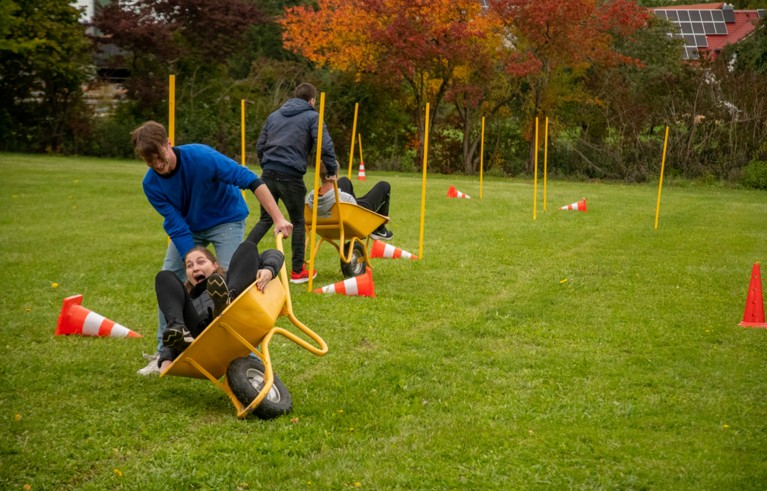
PhD students compete in a team-building relay race at a bootcamp run by the International Max Planck Research School for Intelligent Systems. Credit: Alejandro Posada
That is especially pertinent to the typical scientist who tends to see their work as a calling and not just a job, argues Nina Effenberger, who is studying computer science at the University of Tübingen in Germany. The Wellcome survey found that scientists are often driven by their own passion — making failure deeply personal. But a solid mental-health toolkit (one that includes the skills taught in many of the new workshops) will help them to separate their work from their identity and understand that a grant denial or a paper rejection is not the end of their career. Nor should it have any bearing on their self-worth, Effenberger argues. It is simply a part of a career in science.
Moreover, Dickerson argues that although systemic change is necessary, individuals will drive much of that change. “My sense is that if I can empower the individual, then that individual can also push back,” she says.
Many researchers are starting to do just that through efforts aimed at improving working conditions for early-career researchers, an area of widespread concern. The Cactus survey found that 38% of researchers were dissatisfied with their financial situation. And another survey of 3,500 graduate students by the US National Science Foundation in 2020 (see go.nature.com/3xbokbk) found that more than one-quarter of the respondents experienced food insecurity, housing insecurity or both.
In the United States, efforts to organize unions have won salary increases and other benefits, such as childcare assistance, at the University of California in 2022, Columbia University in New York City in 2023 and the University of Washington in 2023. These wins are part of a surge in union formation. Last year alone, 26 unions representing nearly 50,000 graduate students, postdocs and researchers, formed in the United States.
There has also been collective action in other countries. In 2022, for example, Effenberger and her colleagues surveyed graduate students about their finances, and ultimately won an increase in pay at the International Max Planck Research School for Intelligent Systems (IMPRS-IS), an interdisciplinary doctoral programme within the Max Planck Society in Munich, Germany.

Why the mental cost of a STEM career can be too high for women and people of colour
Union drives are only part of the changes that are happening beyond the classroom. In the past few years, Imperial College London has revamped its common rooms, lecture halls and other spaces to create more places in which students can congregate. “If they have a space where they can go and chat, it is more conducive to research conversations and even just personal connection, which is one of the key aspects of fostering mental health,” Perpetuo says. Imperial also introduced both one-day and three-day voluntary retreats for postdocs and fellows to build personal relationships.
The IMPRS-IS similarly runs ‘bootcamps’ or retreats for many of its doctoral students and faculty members. Dickerson spoke at the one last year. The programme also mandates annual check-ins at which students can discuss group dynamics and raise any issues with staff. It has initiated thesis advisory committees so that no single academic supervisor has too much power over a student. And it plans to survey its students’ mental health twice a year for the next three years to probe the mental health of the institute. The institute has even set various mental-health goals, such as high job satisfaction among PhD students regardless of gender.
Dickerson applauds this change. “One of the biggest problems that I see is a fear of measuring the problem,” she says. “Many don’t want to ask the questions and I think those that do should be championed because I think without measuring it, we can’t show that we are actually changing anything.”
She hopes that other universities will follow suit and provide researchers with the resources that they need to improve conditions. Last year, for example, Trang surveyed the planetary-science community and found that imposter syndrome and feeling unappreciated were large issues — giving him a focus for many future workshops. “We’re moving slowly to make changes,” he says. “But I’m glad we are finally turning the corner from ‘if there is a problem’ to ‘let’s start solving the problem.’”
Nature 631 , 496-498 (2024)
doi: https://doi.org/10.1038/d41586-024-02225-8
Reprints and permissions
Related Articles

- Institutions

How can I break into industry if my CV keeps disappearing into a black hole?
Career Feature 08 JUL 24

Harrowing trends: how endangered-species researchers find hope in the dark

‘All things that wander in the heavens’: how I swapped my ivory tower for the world of science fiction
Career Q&A 04 JUL 24
Unchanged power dynamics still block progress for under-represented groups in academia
Correspondence 02 JUL 24

Give UK science the overhaul it urgently needs
Comment 04 JUL 24

We can make the UK a science superpower — with a radical political manifesto
World View 18 JUN 24

Chinese science still has room to grow
Nature Index 05 JUN 24
Postdoctoral Fellowship - Graph Database Developer
Postdoctoral Fellowship - Graph Database Developer Organization National Library of Medicine, National Institutes of Health, Bethesda, MD and surro...
Bethesda, Maryland
National Institutes of Health/National Library of Medicine
Postdoctoral Fellow - Boyi Gan lab
New postdoctoral positions are open in a cancer research laboratory located within The University of Texas MD Anderson Cancer Center. The lab curre...
Houston, Texas (US)
The University of Texas MD Anderson Cancer Center - Experimental Radiation Oncology
Senior Research Associates x 3 – Bioinformatician Team
The Genomics and Bioinformatics Core (GBC) within the Institute of Metabolic Science – Metabolic Research Laboratories at the Clinical School, Univers
Cambridge, Cambridgeshire
University of Cambridge
Al Medical Engineering at School of Biomedical Engineering
Tsinghua BME offers faculty positions in the emerging research direction of AI Medical Engineering
Beijing, China
Tsinghua University
Shanghai Jiao Tong University Global Recruitment
Interested applicants can send CV to the relevant department/school.
Shanghai, China
Shanghai Jiao Tong University
Sign up for the Nature Briefing newsletter — what matters in science, free to your inbox daily.
Quick links
- Explore articles by subject
- Guide to authors
- Editorial policies
Get the Reddit app
A subreddit dedicated to PhDs.
Organization tips
Hi, I am starting my dissertation (PsyD) and am looking for advice on organization for articles etc. I use Word but am considering Google Docs. What do you recommend? I use Perrla. Any other software that you have found helpful?
- 708.340.7664
- [email protected]
AI in Higher Education: How New Tech Can Both Help and Harm the Higher Education Industry

Why is Understanding Sport Economics Important?

5 Tips for Creating a Marketing Strategy

The Rise of Women in Leadership

Understanding the CPA Exam

What is Design Thinking?

What is Risk Management in Health Care?

What is Sports Management?
Contact information.

Concordia University Chicago Admission Counselor
708.340.7664 [email protected]
By completion and submission of this form, I consent to receive communication from a representative of this institution by phone, text or email regarding the educational program request.
Request Info!
Health care, education leadership, a doctorate, an endorsement, our programs, mba overview.
MBA, General
MBA, Accounting Specialization
MBA, Digital Marketing Specialization
MBA, Finance Specialization
MBA, Health Care Management Specialization
MBA, Leadership and Change Management Specialization
MBA, Project Management Specialization
MBA, Sports Management Specialization
MASTER'S OVERVIEW
MA, Leadership: Higher Education Specialization
ONLINE DOCTORATE DEGREE PROGRAMS
DBA – Strategic Leadership and Innovation Specialization
DBA – Innovation in Health Care Management Specialization
PhD/EdD, Leadership: Organizational Leadership Specialization
PhD/EdD, Leadership: Higher Education Specialization
CSBO ENDORSEMENT OVERVIEW
Highly rated.
- Accredited by the Higher Learning Commission
- U.S. News & World Report Best Online MBA Programs
- U.S. News & World Report Best Regional University – Midwest
- U.S. News & World Report Best Value Schools – Regional Universities Midwest
- U.S. News & World Report Top Performers on Social Mobility
- U.S. News & World Report Campus Ethnic Diversity
Our Mission
Steadfast in Jesus Christ as revealed in the Holy Scriptures, Concordia University Chicago promotes academic rigor in its liberal arts and professional programs; grounds students in objective truth, integrity, and excellence; and practices faithfulness to the Confessional teachings of the Lutheran Church—Missouri Synod, as it forms students for vocations in church, family, and the world.
If you would like more information about Concordia-Chicago’s mission, values or values, please click here .
For more on Concordia-Chicago’s on-campus programs, visit here .
Every product is independently selected by (obsessive) editors. Things you buy through our links may earn us a commission.
A Professional Organizer’s Guide to Minimizing Clutter in the Bathroom

Maintaining an organized bathroom starts with keeping the space free of clutter, and professional organizer Ann Lightfoot, the co-founder of Done and Done Home , says the key is to “always organize a little so you’re never organizing a lot.” She points out that bathrooms are full of little things that get used up pretty quickly, and that “by keeping on top of empty bottles, throwing away expired makeup, your bathroom will stay organized and functional.”
One way she advises keeping clutter from taking over is to wipe down sinks and counters every day. Having to clear off surfaces and pick up bottles and tubes forces you to reckon with all those items taking up space. (And using disposable cleaning wipes or a launderable microfiber sponge can make this task less of a hurdle.) Daily maintenance, however, may not be enough to keep your collection of Sephora samples and almost-empty personal-care products from growing to an unreasonable size, so Lightfoot recommends a more in-depth declutter every three to four months or seasonally, not just tossing expired items, but also getting rid of anything that realistically isn’t going to get used. (Part of the decluttering process — the hardest part — is admitting to yourself that the tube of liquid highlighter you were so sure would change your life isn’t all that life-changing.)
Once you’ve edited down your things, instead of cramming them into the existing cabinets and drawers, Lightfoot recommends investing in small pieces that can double or triple available storage — and that will also set limits on all that stuff that wants to come in. We asked Lightfoot to pick out the go-to organizers she recommends to her clients, and the ones that she uses in her own home.
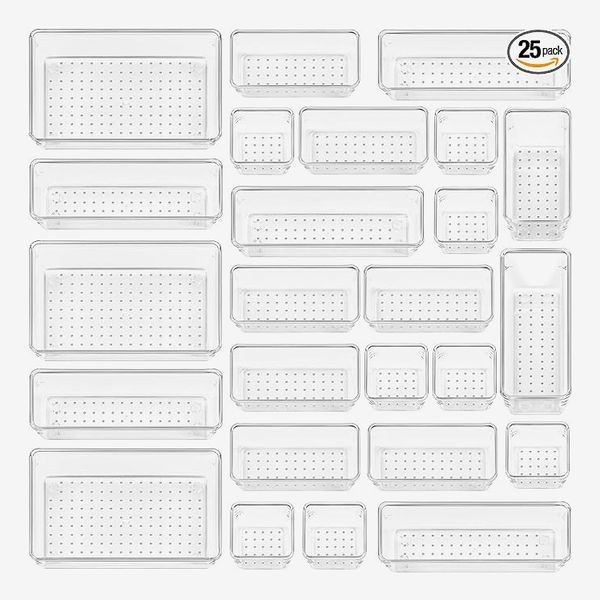
Because cabinetry can contain all your stuff and keep it hidden away, many people don’t think it’s necessary to organize their stuff into bins and containers under their sinks and in their drawers. But those smaller containers make it easier to find and retrieve what you need, and clear containers can help you see what you already have. No more excavating under piles of old makeup or skin-care products or having to pull out bottles of lotion and shampoo one at a time to try to find the hair dryer. To bring order to drawers, cabinets, vanities, or open shelving, Lightfoot likes this set of clear plastic trays.

Although you might be inclined to choose wooden or woven wicker bins or even metals ones for their look and feel, for stuff that’s going to be hidden within cabinet recesses anyway, opt for more practical, durable materials. “In the bathroom, we always recommend clear plastic bins that won’t be ruined by spilled products or water,” Lightfoot says. Size matters, too: She suggests using deep bins with handles for the space under the sink and small, shallower bins for wrangling the contents of drawers.

Establishing a dedicated place for makeup and skin-care samples sets a physical limit on how many of these tiny and irresistible items you can amass at any given time. Any bin or box will do (I use a Tiffany box for my trove), but going with a clear bin allows you to see your stash, offering a visual reminder to use that little packet of Sunday Riley moisturizer.

Modern architecture and design pose new organizational challenges. “In new builds, a lot of times there is storage under the sink, but it’s one large drawer and there’s no bigger area,” Lightfoot says. So we must add storage space back. In a small bathroom, “over-the-toilet shelves can radically change the amount of storage space available and make organization easier,” she says.

When selecting an over-the-toilet unit, consider form and function. A storage cabinet should fit your aesthetic — but it’s even more important that it fits in your particular bathroom space. “Freestanding and wall-mounted units are both good options depending on your space and budget,” Lightfoot says. A wall-mounted cabinet like this one can make a small bathroom look less visually cluttered, but it may not be ideal if you’re a renter or don’t want to make any holes in the wall.

The space under the sink is valuable organizational real estate, but it can quickly turn into a black hole into which toilet paper and hotel shampoos disappear, never to be seen again. “We recommend adjustable organizing units that can be pulled out and act as drawers and can be configured to work around pipes,” Lightfoot says.

“If wall space is available,” Lightfoot says, “additional shelving can make all the difference, and there are a million different styles and materials to choose from. We love these clear acrylic floating shelves for things like nail polish and perfume.”

Among those million different styles is this set of sturdy floating shelves, which is ideal for holding bulky or heavy bathroom staples like extra towels, décor, or jars for cotton balls or Q-tips.

“Over-the-door adjustable organizers are great for people who don’t have the luxury of a large vanity or extra drawers,” Lightfoot says. “We recommend units that are plastic or metal, as opposed to fabric, for their sturdiness and waterproof materials.”

“There used to always be linen closets, so at least you could have a bin in there of back stock,” Lightfoot says, “but most homes don’t have linen closets anymore.” For stashing extra toilet paper or cleaning supplies, “we love narrow cabinets that can fit in tiny spaces next to the toilet or sink,” Lightfoot says.

Sometimes an obvious solution, like installing wall hooks, is the answer to your bathroom-clutter problems, “especially if you have kids who leave towels on the floor,” Lightfoot says. This set of hooks comes in many finishes that should match most fixtures. (For a less permanent option, you could always get Command hooks .)

To discourage members of your household from depositing their dirty towels or worse, their dirty underpants, on the floor, Lightfoot suggests placing a hamper in the bathroom if there is space available for it.

“Depending on where you store your towels, there are a few different options to keep them organized,” Lightfoot says. “If you store your extra towels in the bathroom, shelves and hooks are probably your best bet.” She picked this wall-mounted unit, which has space to both hang and to stack towels when not in use.

For those lucky enough to have dedicated space for storing towels and other household linens, Lightfoot says to invest in a set of shelf dividers. “If you have a linen closet, shelf dividers can work well to keep stacks from falling over,” she says.
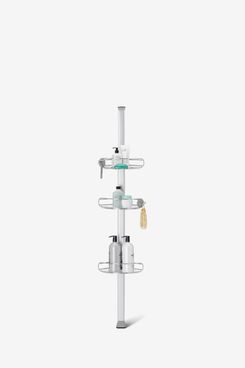
Lightfoot calls this shower caddy “one of our all-time-favorite products for the bathroom,” for keeping shampoos, conditioners, body washes, poufs, scrubbers, and all other bath paraphernalia organized and off the floor or ledge of the shower or tub, where they will become gross. “It’s very difficult for bottles to stay dry if they’re on the floor, whereas with a caddy the water drains right off of it and then it air dries.”
The Strategist is designed to surface useful, expert recommendations for things to buy across the vast e-commerce landscape. Every product is independently selected by our team of editors, whom you can read about here . We update links when possible, but note that deals can expire and all prices are subject to change.
- the strategist
- trust me i should know
- organization
Every product is independently selected by (obsessive) editors. Things you buy through our links may earn us a commission.
Deal of the Day
Micro sales, greatest hits, most viewed stories.
- The 11 Very Best Shampoos
- Everything Worth Buying at Target’s Circle Week Sale
- What Carly Mark Can’t Live Without
- The $40 Pants Making the Rounds Through the Brooklyn Theater Scene
- This Thing Is Like a Kindle, But It Fits in My Pocket
- A Professional Organizer’s Guide to Minimizing Bathroom Clutter
- The 11 Very Best Bluetooth Speakers
Today’s Top Clicked

How-To Geek
7 tips for structuring and organizing text in word.

Your changes have been saved
Email Is sent
Please verify your email address.
You’ve reached your account maximum for followed topics.
Quick Links
Non-breaking spaces, automatic hyphenation, page and section breaks, keep with next, three more pagination controls.
Microsoft Word is surprisingly flexible in letting you position your words, lines, and paragraphs exactly how you want. The issue, however, is that different tools are in various places across the program's interface. So, we've compiled some of the handiest tips into one handy article!
Some of the screenshots in this article contain symbols such as •, °, and ¶ (these are called non-printing characters because they don't show when you print your document). They're activated and deactivated by pressing Ctrl+Shift+8, and they help you see how your text is structured and organized.
As its name suggests, a non-breaking space between words ensures they don't break up over two lines. There are sometimes situations when you want to keep certain strings of text together—such as a person's first name and surname, a date's month and day, or a phone number's area code, prefix, and subscriber number.
For example, in the text below, it looks odd to have April and 22nd split up.

To rectify this, delete the space between the words you want to keep together, and with your cursor in the place where you want to add the non-breaking space, press Ctrl+Shift+Space. You will then see these two parts pulled together on the same line.

Get into the habit of using this shortcut key between any elements you want to keep together, even if they don't currently appear near the end of the line. Then, if you change your typeface or font size, you can rest assured that they'll not split across two lines.
Having said that, don't overuse non-breaking spaces—especially if you're using justified alignment—as doing so disrupts Word's efforts to space your lines evenly and forces words to squeeze together onto a single line. So, while they're a useful tool, use them sparingly and only where absolutely necessary.
Useful if you're writing a complex academic paper with dozens of long words, or narrow columns, such as in a newspaper article, automatic hyphenation is Word's way of spacing your words out more evenly.
In the example below, because the paragraph has many long words, its spacing is untidy and inconsistent, leaving unsightly gaps.
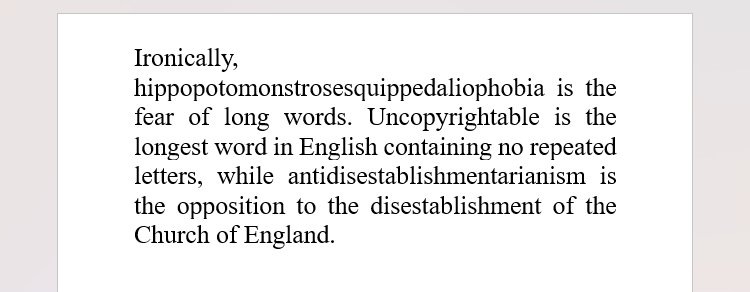
Similarly, if you are using narrow columns in your document, Word will struggle to keep the spacing consistent as it tries to work out how to navigate the limited width. Notice the large gap between the words are and traditionally .
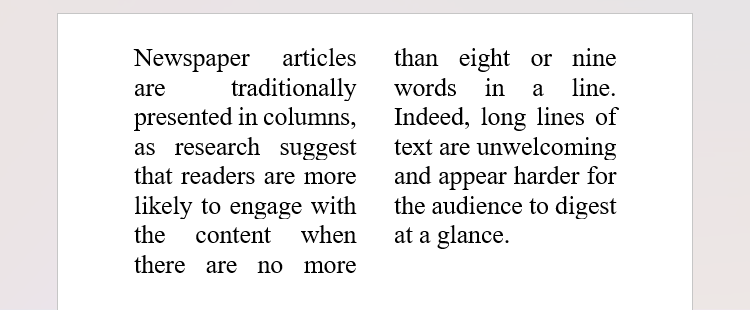
Enabling automatic hyphenation will resolve this issue. With your cursor anywhere in your Word document, open the "Layout" tab, and click "Hyphenation." In the drop-down menu, click "Automatic."
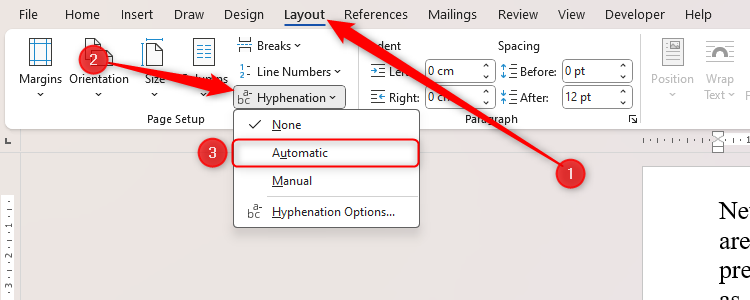
You will then see certain words break up across two lines, resulting in more consistent spacing and a more aesthetically presented document.
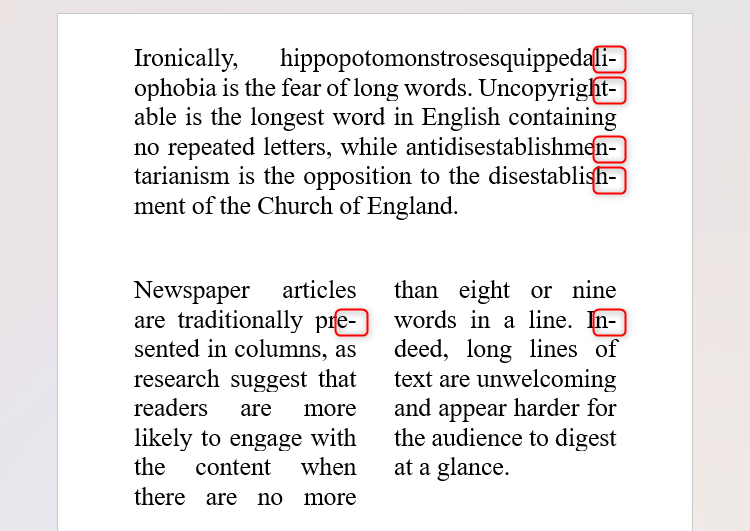
If you're still not happy with the spacing and layout of your words, click "Manual" in the Hyphenation menu to position the hyphens manually.
As an academic proofreader, I've lost count of the number of times I've seen people start a new page by repeatedly hitting Enter. Likewise, if people want to divide a paragraph into two columns while retaining the original layout in the rest of the document, they might use a two-columned table. Both of these methods are structurally insecure—in other words, if they later change the font size, or add or delete content to earlier parts of their work, it will disrupt the document's layout.
Once you get your head around how they work, Word's Breaks are an invaluable tool for controlling your document layout, adding a barrier between different sections of your work.
Start by activating Word's non-printing characters (the ¶ icon in the Home tab on the ribbon). Then, head to the "Layout" tab, and click "Breaks."
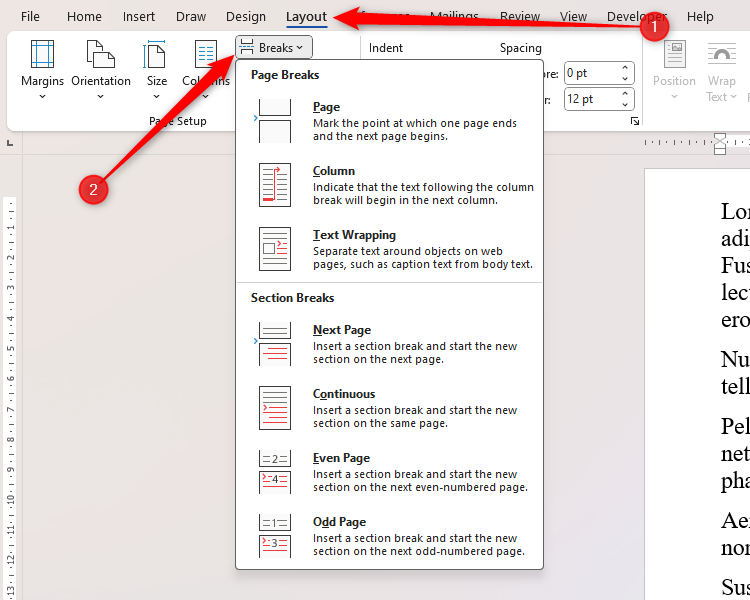
Let's explore each of these options in more detail.
Adding a Page Break moves you to the next page of the document, even though you haven't necessarily reached the end of the previous one. This is useful if, for example, you have a contents page at the start of your work and want to begin the main body on the next page, or if you have a bibliography at the end of the document that you want to separate from the pages before.
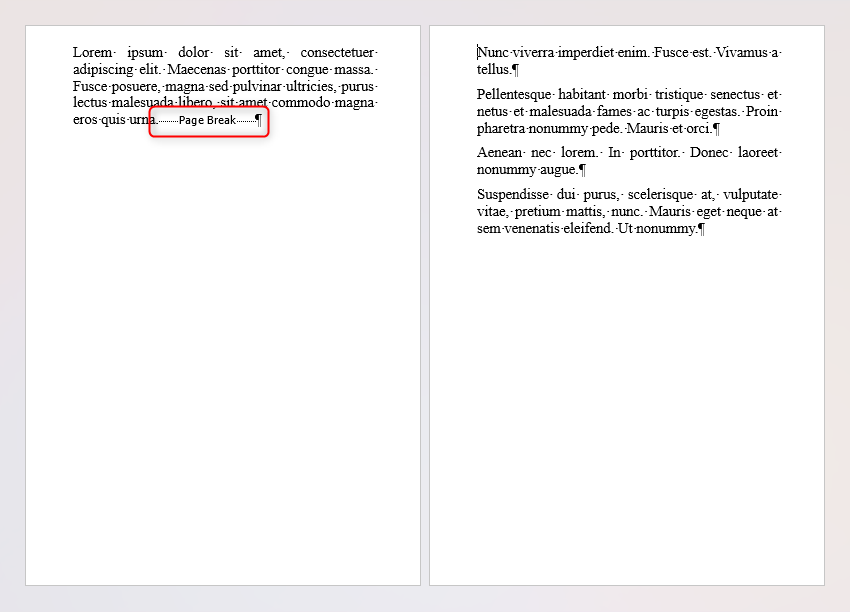
If you have page numbers activated, they will continue as usual, and any general formatting you make to the page layout on one side of the Page Break (such as page orientation or paper size) will apply to the other.
Column Break
If you have used columns within your work (Layout > Page Setup > Columns), a Column Break will move your cursor—or the text after the Column Break—to the next column.
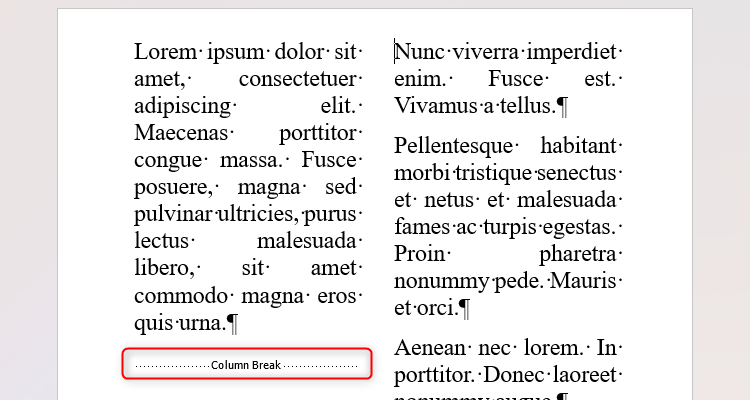
Adding a Column Break in the last column of your document will force Word to start a new page and move the text to a new column on that page. If you haven't used columns in your document, a Column Break will act in the same way as a Page Break.
Text Wrapping Break
If you have text wrapped around an image, the Text Wrapping tool in the Breaks menu will end the wrapping and move your cursor to the first line beneath the image.
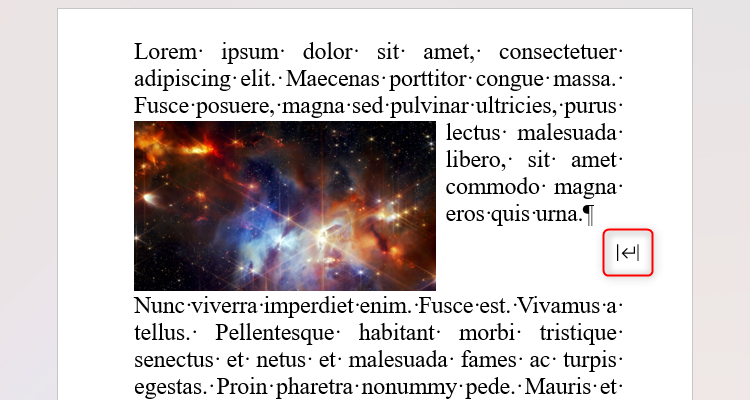
You might use this tool if the text surrounding the image relates to what the image shows, while the following paragraph is still on the same topic but does not discuss the content of the picture.
Next Page and Continuous Section Breaks
Section Breaks are more definitive than Page Breaks, allowing you to format each section of a document separately.
For example, you might want to use columns in one section but not in the next section. If you use a Page Break, the columns will continue onto the next page, but a Section Break tells Word that you only want the columns to appear in that section. Similarly, adding a Section Break means you can use different page footers or page numbers for different parts of your work, such as in a legal or academic paper.
A Next Page Section break ends the current section and moves to the next page, while a Continuous Section Break starts the next section on the same page.
The screenshot below shows a Continuous Section Break and a Column Break on the same page. The Section Break allows me to use two columns in the next section, while the Column Break helps me to divide my text into two appropriately sized columns.
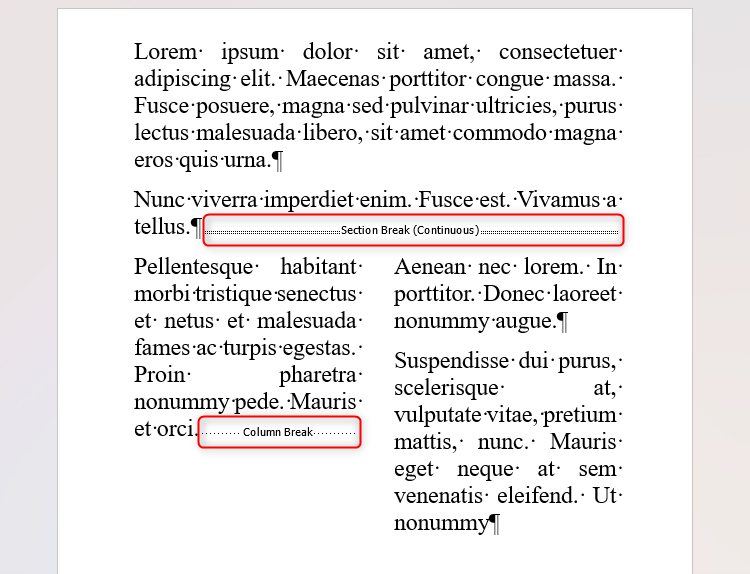
Even Page and Odd Page Section Breaks
These types of breaks are entirely stylistic and often used in books. For example, if you wanted each new chapter of a novel to start on an even page, you would use the Even Page Section Break.
This valuable tool keeps a paragraph or heading next to the following paragraph, useful if a natural page break would otherwise split them up.
In the example resume below, the bullet point looks unusual on its own at the top of page 2—it would be better if it stayed with the two lines of text that stayed on the previous page.
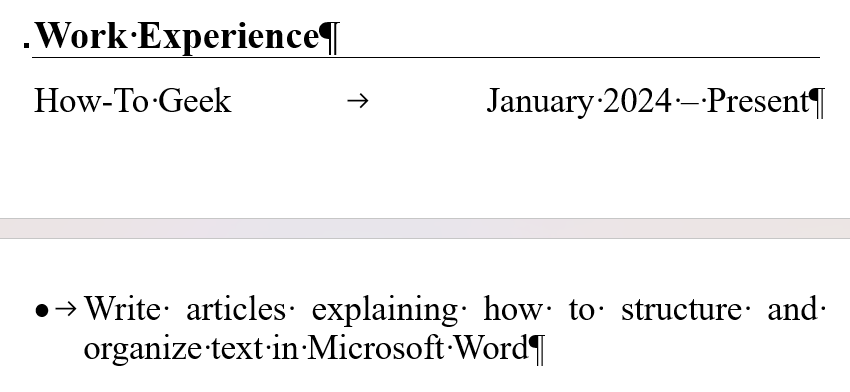
Notice the small pagination marker next to the Work Experience title. This is telling me that it is automatically formatted to stay with the text directly beneath it, something that happens automatically when you use a Heading style.
However, the following line, starting How-To Geek , is written using the Normal style, so it does not have this pagination marker. So, we need to manually tell that line to stay with the next line.
To do this, click anywhere on the line of text that you want to keep together with the following line, and click the "Paragraph Settings" icon in the Home tab on the ribbon.
Then, in the Paragraph dialog box, open the "Lines And Page Break" tab, and check "Keep With Next," before clicking "OK."
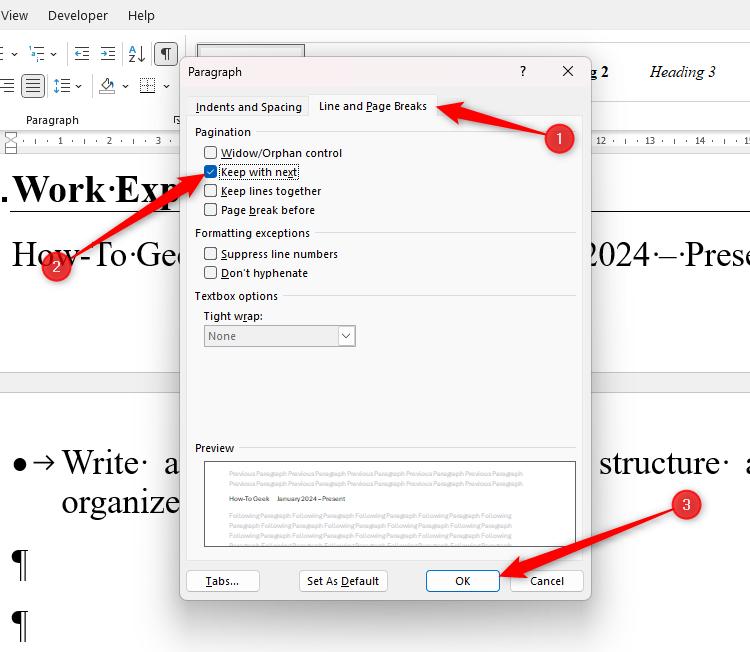
You will then see the lines pull each other together, so that they're not affected by the natural page break. Notice, also, how that Word has added a pagination marker to tell you that you've changed the paragraph settings.
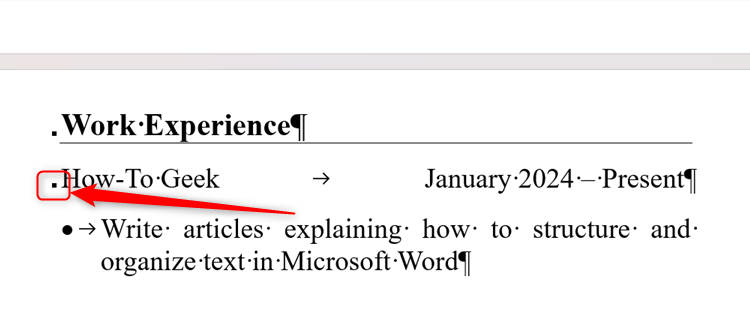
In the same Paragraph dialog box (press Alt+H+P+G to open it quickly), you have other useful tools to control your paragraphing:
- Widow/Orphan Control —This option stops the first line of a paragraph from appearing on its own at the end of a page, and the last line of a paragraph from appearing on its own at the start of the next page. Instead, it will ensure that at least two lines stay together.
- Keep Lines Together —If you want to force all lines of a paragraph to stay together, rather than splitting between two pages, this is the option for you.
- Page Break Before —This is a good option for ensuring a paragraph always stays at the top of a page, no matter where it is in your document.
As well as taking more control of your document's structure, check out our useful tips for presenting your work professionally .
- Microsoft Word
- Microsoft 365

IMAGES
VIDEO
COMMENTS
One great thing about working in academia is that (ideally, most of the time) you get to be your own boss. On the other hand… you have to be your own boss. Unless you have a micro-managing ...
Maintaining PhD Productivity: Tips for Mindset and Organisation. By Britt Berning. A PhD is a big, daunting challenge to undertake. The list of things to tick off is seemingly never ending: reading in your field (and out of your field), experimenting, writing and communicating your research, and much more.
The first step in organizing your PhD work is to set clear goals for yourself. Define the objectives of your research. Develop a clear and realistic plan for your PhD work, including milestones and deadlines for each task. 2. Develop a research plan. Once you have set your goals, develop a research plan that.
Monthly. At the beginning of each month, I sit down to reflect on the previous month and plan out the coming month. This generally consists of a title page, monthly tasks list, monthly inventory, monthly overview, and my priority tasks and deadlines: Monthly title page and tasks page. The title page is mostly just to mark the new month.
20. Enjoy your PhD! It can be tough, and there will be days when you wish you had a 'normal' job, but PhDs are full of wonderful experiences and give you the opportunity to work on something ...
Long term weekly planning. I use my Gantt chart every 2-3 months to make a weekly plan. This weekly plan fits on an A4 piece of paper, and I quickly type it up a few weeks before my last one expires. It basically contains a list of the next 10-12 weeks, with my set in stone commitments and my 'focus' for that week.
A daily routine is crucial for PhD students, as it helps to manage the various demands of graduate school and maintain a healthy work-life balance. A well-organized schedule allows you to prioritize tasks and responsibilities, making it easier to stay focused and avoid feeling overwhelmed. In addition, having a consistent routine can help you ...
The PhD journey can be complicated, hectic, and sometimes, feel like hell. A whirring, excited brain is great for research, but can be difficult to manage. Ellie King speaks about the often neglected skill of a PhD: organising your brain, and offers some tips on how to get things a bit neater.
To write my notes, I use Evernote. To make it more organised, I create a notebook based on the research category. Within a notebook, I create a note dedicated to research article that I am reading ...
TIP #8 Practice self-motivation. If you were a graduate student or you had a "real job" for several years before starting the PhD, it is highly likely that you were constantly bombarded with specific projects to finish and that the feedback from your professors or your boss helped you remain inspired and set new challenges for yourself ...
A Template To Help You Structure Your PhD's Theoretical Framework Chapter. In this guide, I explain how to use the theory framework template. The focus is on the practical things to consider when you're working with the template and how you can give your theory framework the rockstar treatment. Use our free tools, guides and templates to ...
First of all, a graduate school is a learning process so finding what is perfect from you from the start is a valiant endeavour but not necessarily sure fire.. You should start to use a data base system, some (mentioned in comments) that come to mind are Mendeley (free), EndNote (commercial), RefBase (free) to mention a few. If you consider going into LateX (which many of us swear by) then I ...
A lot of effort in the PhD process involves finding money for research. This web page focuses on how to improve your chances of getting much-needed funding. 6. The PhD Project. This nonprofit organization works to increase the number of racially and ethnically diverse business professors with doctorates. 7. Resources for Dissertators and Thesis ...
3. Wharton Communications Program. The Wharton Communication Program helps Wharton PhD students become more effective communicators and thus better presenters, public speakers, and writers — all critical skills in academia. All doctoral students are provided with access to on-site, one-on-one writing coaching during the academic year.
Tara Brabazon shares her 10-step regime for steering emotionally drained postgraduate students through the final stages of their thesis. Choosing a PhD subject. A well-chosen doctoral thesis will have a focus that can be explored in the appropriate time and built on in the future. How to get ahead with a PhD.
In the field of Organizational Behavior, researchers draw on the methods and concepts of psychology and sociology to examine complex organizations and the ways that people behave within them. Scholars in the doctoral program in Organizational Behavior at Harvard Business School are prepared to pursue an interdisciplinary inquiry into issues ...
The key is knowing what to do to prepare and how to compile and submit a strong application. We hope these 10 tips will help you get started. 1. Be true to yourself: First and foremost, consider your goals. Many students are initially interested in pursuing a Ph.D. because they want to become a professor.
Organizational Behavior. In the field of organizational behavior we research fundamental questions about the behavior of individuals, groups and organizations, from both psychological and sociological perspectives. A distinguishing feature of Stanford's PhD Program in organizational behavior is the broad interdisciplinary training it provides.
Just don't stress about it all, keep your milestones in view, chip away at the work towards them and make sure you take time out for yourself. Drink water regularly throughout the day, eat sensible food - I find meal prep helps with that. Try and have a social life and get regular exercise.
Bibliography - word (with hyperlinks and headings) Schedule, project management - excel (pages for broad to do list, another for non urgent links and ideas, then a page per month. Used like a diary, but groups of columns for projects) Data analysis - jupyter notebook Meetings and appointments - outlook as everyone in my lab also uses this.
Simple Way to Organize Computer Files| Tips for researchers! #PhD #FileOrganization #PhDLife (Long Title)I am not a very organized person, but upon 10 years ...
In the United States, efforts to organize unions have won salary increases and other benefits, such as childcare assistance, at the University of California in 2022, Columbia University in New ...
Organization tips Hi, I am starting my dissertation (PsyD) and am looking for advice on organization for articles etc. I use Word but am considering Google Docs.
The standard degree for postsecondary professors teaching at a 4-year college or university is a PhD. Earning your Phd in Organizational Leadership could prepare you to teach college courses in business, management, or leadership fields. As a professor, you'll deliver lectures, assign homework, create curricula for your classes and more.
Are you considering a doctorate in psychology? If so, you're in good company — thousands of Americans are awarded doctorates in psychology every year. However, doctoral programs are an incredibly varied field of study, with options available for you to study online, in person, or in a hybrid format.
Maintaining an organized bathroom starts with keeping the space free of clutter, and professional organizer Ann Lightfoot, the co-founder of Done and Done Home, says the key is to "always ...
Non-breaking Spaces As its name suggests, a non-breaking space between words ensures they don't break up over two lines. There are sometimes situations when you want to keep certain strings of text together—such as a person's first name and surname, a date's month and day, or a phone number's area code, prefix, and subscriber number.